TH Y
Y CHURCH
R T H E C H U R CH
CELEBRAT I N G T E N YEARS

Y CHURCH
R T H E C H U R CH
CELEBRAT I N G T E N YEARS
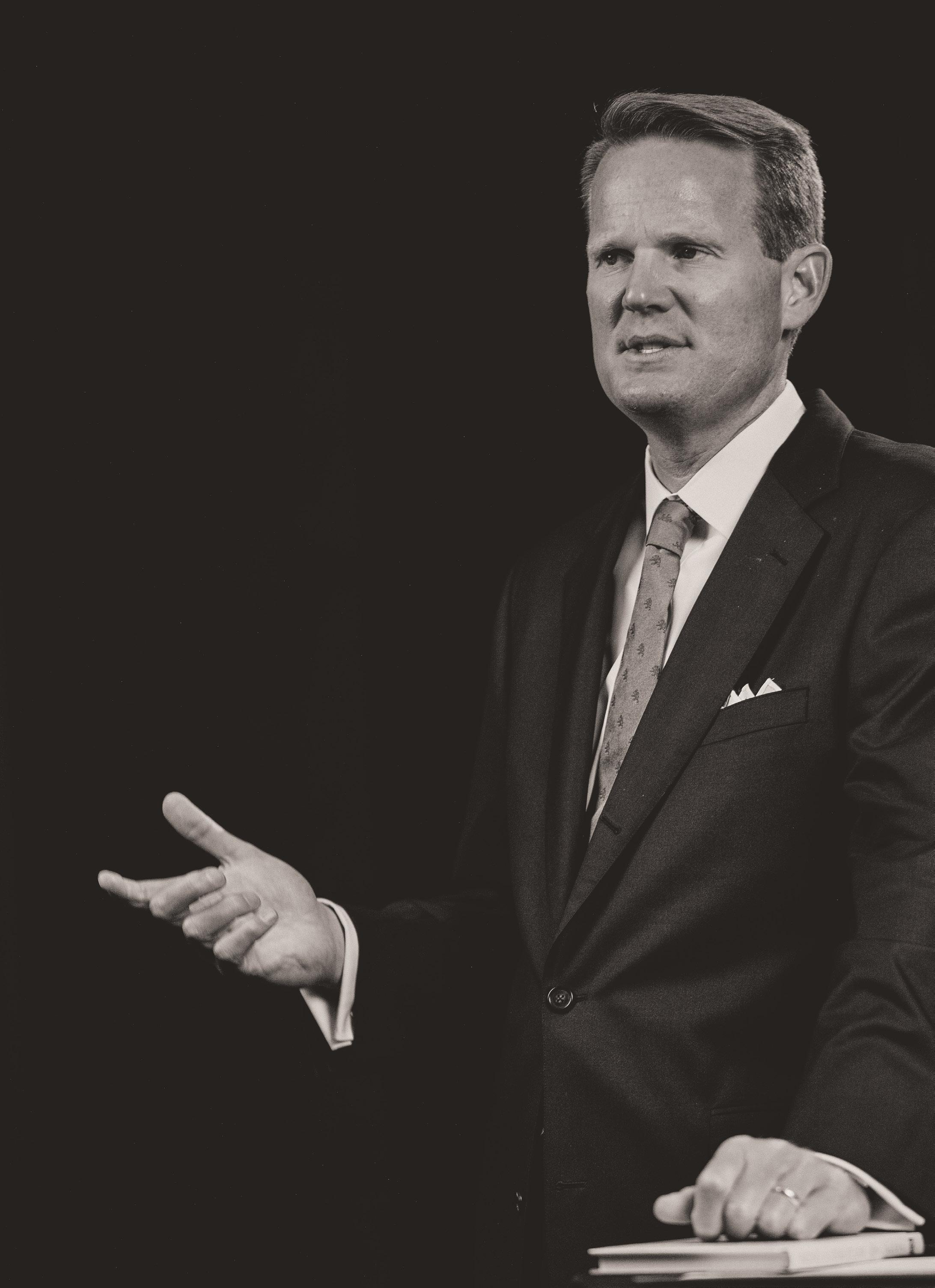
can hardly believe that it has now been 10 years since God called me and my family to Kansas City to serve Midwestern Baptist Theological Seminary. It feels like just yesterday that we packed our belongings, loaded our children—then ages 9, 8, 7, 5, and 4—and set out for Kansas City.
In the Lord’s kind providence, these past ten years have been nothing short of remarkable when one considers the institutional transformation that has taken place. A significant part of that transforma tion has been our determination that Midwestern Seminary would exist for the Church.
Though there have been numerous changes throughout the past ten years, the for the Church mission has remained constant. I would even argue that the for the Church mission has been the key reason we’ve more than quadrupled in size. Our watching constituency has witnessed our commit ment to the local church, continues to resonate with that commitment, and, together, is partnering with us to prepare a new generation of pastors, min isters, and missionaries for more faithful service.
As I begin a new decade of service at Midwestern Seminary, I want to reassure you that we remain steadfastly committed to our for the Church mission. It’s an enduring, perennial mission that will mark Midwestern Seminary for time and eternity. That is one of the reasons I am excited about this edition of the Midwestern Magazine.
In these pages, you will read more about our mis sion to be for the Church and how it has impacted everything we do from the ground up. My prayer is that you would be edified and encouraged as you read, and that you would be reminded to pray for us and our work in Kansas City and beyond. May God continue to bless Midwestern Seminary as we continue to be for the Church.
Sincerely, JASON K. ALLEN, PH.D. President Midwestern Baptist Theological Seminary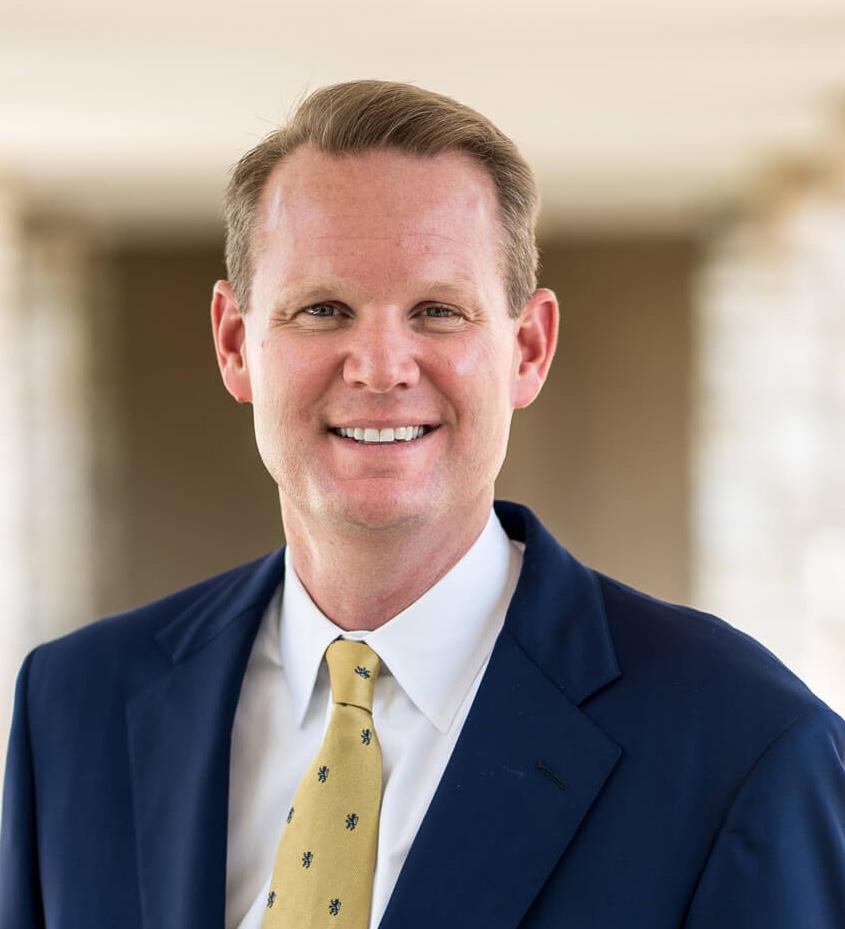
Jason K. Allen PRESIDENT
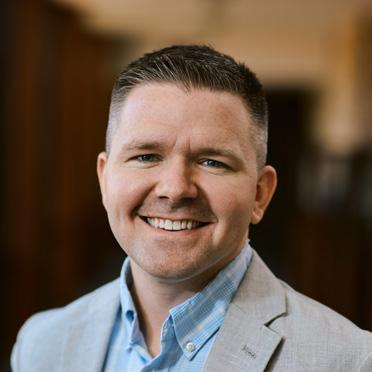
Jason G. Duesing PROVOST
James J. Kragenbring
SENIOR VICE PRESIDENT FOR INSTITUTIONAL ADMINISTRATION
Charles W. Smith, Jr.
SENIOR VICE PRESIDENT FOR INSTITUTIONAL RELATIONS
EDITORIAL
Lucas Hahn CHIEF EDITOR
Brett Fredenberg
ASSOCIATE EDITOR
Grace Pike
ASSOCIATE EDITOR
Abby Currence PROJECT MANAGER
Kody Gibson VICE PRESIDENT OF COMMUNICATIONS
ART
Hyacin DeBusk
Dave Wright LAYOUT & DESIGN
Kaden Classen
Josh Redd
PHOTOGRAPHERS
© 2022 Midwestern Baptist Theological Seminary. All rights reserved. Reproduction in whole or in part without permission is strictly prohibited.
5001 N. Oak Trafficway Kansas City, MO 64118 (816) 414-3700
Midwestern Seminary maintains professional and academic accreditation with two accrediting associations: The Commission on Accrediting of the Association of Theological Schools in the United States and Canada and The Higher Learning Commission of the North Central Association of Colleges and Schools (HLC).
CONNECT WITH US
mbts
midwestern.seminary
midwesternseminary
I’m very pleased to present this special edition of the Midwestern Magazine. As we considered the focus of this issue, we continually returned to one theme: the Lord’s goodness to Midwestern Seminary. Much like David wrote in Psalm 145, we recognize that “The Lord is good to all, and his mercy is over all that he has made.” We’ve seen His goodness and mercy time and time again here at Midwestern Seminary over the past decade, and so, for this edition, the theme is: 10 Years – For the Church, Until Every Church Healthy.
This issue seeks to reflect on the goodness and mercy of the Lord to Mid western Seminary, with special recognition to Dr. Allen’s 10-year anniversary as president. With contributions from key influences in Dr. Allen’s life and senior administration at the seminary, we hope this issue walks you through major elements of the turnaround at Midwestern Seminary. The cornerstone of the last decade at Midwestern Seminary has been our for the Church vision of theological education. As we enter the next decade of Dr. Allen’s leadership, the vision and mission the Lord has given us have not changed. Midwestern Seminary is for the Church, until every church healthy.
I’d like to express my sincere gratitude for the contributing authors in this issue: Dr. Jason Allen, Dr. R. Albert Mohler, Jr., Dr. Jason Duesing, Dr. Charles Smith, James Kragenbring, Dr. Steven Lawson, Dean Inserra, and Jared Wilson. Each one has played a significant role, whether directly or indirectly, in the history of Midwestern Seminary. I pray their reflections on the story of Mid western Seminary encourages you.
Lastly, this issue simply would not have been possible without the hard work and diligence of the authors, editors, photographers, and designers who put it together. I’d especially like to recognize the work of Hyacin DeBusk and Brett Fredenberg who made this issue come to life through their creativity, contributions, and tireless effort.
We pray that you, too, may see the goodness of the Lord through the work He has done, and we invite you to join us in celebrating the 10-year anniversary of Dr. Allen’s presidency.
For the Church and For His Kingdom,
Chief Editor, Midwestern Magazine
Managing Editor, For the Church Director of Marketing & Content Strategy
ADMISSIONS: admissions@mbts.edu | (816) 414-3733 COMMUNICATIONS: communications@mbts.edu | (816) 414-3708 INSTITUTIONAL RELATIONS: ir@mbts.edu | (816) 414-3720
SUBSCRIBE to Midwestern’s Monthly E-mail Newsletter at mbts.edu/subscribe.
The reality is that these questions are unanswerable. But they point to the fact that leadership is still something of a mystery for mortals. It is clear that we cannot do with out leaders, and it is clear that leadership is absolutely essential for every dimension of human society. And yet, there is no single agreed upon definition of leadership. To put it in intuitional terms, we’re not sure how to de fine it, but we know it when we see it.
Christians understand that questions about leadership are deeply rooted in the biblical tradition itself. For one thing, the Bible is absolutely clear about the fact that God’s people require leadership. In the Old Tes tament, it was clear that God appointed Moses as the great general of his people to lead the children of Israel out of captivity to Pharaoh in Egypt. This magnificent display of the providence of God was translated into human history in such a way that Moses became a singular figure in the history of the entire nation of Israel. For that reason, the children of Israel are often referred to as the children of Moses, even more than they are referred to as the children of Abraham.
The example of Moses raises some of the most import ant questions about leadership. It is clear that Moses was not a volunteer. He was summoned, and in the most inescapable way. God spoke to him out of the bush that burned and was not consumed. And God made clear that he had a purpose for Moses and that it was the duty of Moses to respond to the call. The history of the Exodus from Egypt is itself a demonstra
tion of the necessity of leadership and of the difficulties of leadership.
If we fast forward to the New Testament, models of leadership are found everywhere we look. In one sense, the first reference to leadership in the New Testament story takes us to the role of Caesar and to the responsibility of kings. But very quickly, we come to un derstand that all of these human leaders, regardless of their title and claims to glory, are merely servants of the Most High, whether they know it or not. And in the sto ryline of the New Testament, Caesar in Rome and various kings on their thrones, turned out to be just set pieces in order for God to make clear His glory in the incarnation of the Son of God, as the King of Kings and Lord of Lords. But human lead ership is valued and it is essential, so much so that by the time we get to the formation of the early church in the book of Acts, leadership is one of the first issues addressed.
First of all, leadership was represented among the disciples and by the disciples. By the time the New Testament church came unto a revealed conscious ness of itself, it knew that the church was estab lished upon the foundation of the apostles and the prophets—all leaders. Some of the most intense energy invested in the New Testament church was in the development of leaders, the calling out of leaders, and in understanding the criteria for godly leadership in the church.
In this sense, the church is a microcosm of creation. Leadership, in its essence, is best understood as part of the dominion mandate in the first chapter of the Bible. Leadership is not merely an adaptation or ad justment to the reality of human sin, it was part of God’s plan for humanity from the very beginning. In other words, leadership would have been an issue in the garden of Eden.
Are leaders made or are they born? Are they forged by destiny or are they made by events? Do leaders volunteer for service, or are they summoned by a call?
Nevertheless, east of Eden, we are now even more dependent upon human leaders, and Christians understand this with a gravity unique to those who are followers of the Lord Jesus Christ. We think of the leadership examples from the Old Testament, like Joshua and King David, and we add to that the leadership responsibilities invested in early church leaders, such as the Apostles Peter, James, and Paul. Together, we come to understand that the early church, as the church today, is largely identified with its leaders, and faithfulness or unfaithfulness often comes down to the character and conviction of the one who leads.
The church has also been defined by leadership and by its leaders throughout the nearly twenty centu ries of Christian experience. We think of the ear ly leaders of the church in its first few centuries, commonly referred to as the Fathers of the church. Moving through church history, we cannot help but to mark milestones by so many of the leaders who defined Christianity and Christian faithfulness for their times. We think of figures such as Augustine, the great Bishop of Hippo, and then move forward to the Reformers such as Martin Luther and John Calvin. We should note that all three of these lead ers were known first and foremost for their preach ing of the Word of God, but they were also known for the leadership they exerted through the estab lishment of Christian ministries, the furtherance of Christian learning, and the expansion of Christian ity by the preaching of the gospel. In more recent centuries, the long line of leadership succession has
continued. But if anything, we arrive at the present age with the understanding that the Church of the Lord Jesus Christ currently has no surplus of faith ful leaders. We face a situation that can only be de scribed as a leadership deficit. And the faithfulness of the Christian Church in the coming generations will require a corps of leaders who are marked by character, conviction, and courage.
The biblical emphasis upon character at the center of leadership is so pervasive that it is absolutely sys temic. Everywhere you look, the model of leadership found in the Scripture is tied to the character of the leader. This certainly does not mean that the lead er is perfect, because the leader is himself a sinner, marked by all the effects and motivations of sin. But, as noted earlier, a sinful world is in a situation of even more dramatic need when it comes to leaders. If leaders would have been found in Eden, they are far more essential once sin enters the picture. But this also means that leadership gets very complicat ed. Christians know that at the end of the day, there is no clean separation between the moral qualities of a leader and the long-term influence of a leader.
King David is presented in the Scriptures in all of his glory, but also in all of his tragic sinfulness. And yet, he’s also described as a man after God’s own heart. As Paul instructs the church concerning those men who will serve as elders and teachers of the church, we should note that character is marked as an essen
“The biblical emphasis upon character at the center of leadership is so pervasive that it is absolutely systemic. Everywhere you look, the model of leadership found in the Scripture is tied to the character of the leader.”
tial criterion. One of the reasons so many lead ers fail in our times—even in the church—is that their leadership abilities outstripped their moral qualities. As Christians understand, that
passionate adherence to those convictions, but the leader’s ability to convey those convictions to others, who will respond with a faithfulness that would otherwise never happen.
A third component of leadership is courage. Once again, our immediate thoughts are drawn to Scripture where demonstrations of courage are revealed in the leaders of Israel, and in the leaders of the early church. The courage of these leaders was the courage unto death.
is a story that will eventually end in disaster. On the other hand, a leader after God’s own heart may be used to transform a church, an institution, and even an age.
I have long argued that conviction is the miss ing ingredient in almost all secular definitions of leadership. In a managerial age, the world wants to define leadership almost exclusively in technical terms. But the Christian Church must surely understand that leadership can not be reduced to technique. Just consider the Apostle Paul’s admonitions to Timothy, and the repeated emphasis upon conviction in the New Testament. There can be no question that conviction stands at the very heart of a biblical conception of leadership. Of course, convic tional leadership is disastrous if the convictions are not true. We are reminded of the biblical truth that the convictions of the Church, and of the Christian leader, must be the convictions set out in God’s Word, consistent with the faith once for all delivered to the saints. Leaders are not those who manufacture the right convic tions; leaders after God’s own heart are those who are passionate advocates of the convictions revealed in the Word of God. But the essence of leadership comes down not only to the leader’s
Without question, they were driven by convic tion and forged by character in such a way that they responded with unprecedented courage as they led God’s people out of captivity to Pharaoh in Egypt, into the land of promise, through cen turies of struggle and building, and eventually in the establishment of congregations, in the feeding of the flock of God, and in the establish ment of great works and ministries to the glory of Christ. Leaders who lack courage never truly lead, but the courage that counts is the courage that is based in conviction and character.
The secular world is frantic as it seeks to under stand leadership in a way that can be replicated, multiplied, and even manufactured. Over the course of the last forty years, countless leader ship development programs, graduate schools, and professional methods have been proposed. Bestselling books have been published and speakers and consultants have reaped a consid erable harvest by promising leadership selec tion, development, and success.
But Christians really do understand that the leadership that is most important is the leader ship of the Christian Church. There’s nothing more important than the leadership defined in Scripture as exercised by parents in the home, by preachers and leaders in the church, and by those who are determined to further the pur
“A leader after God’s own heart may be used to transform a church, an institution, and even an age.”
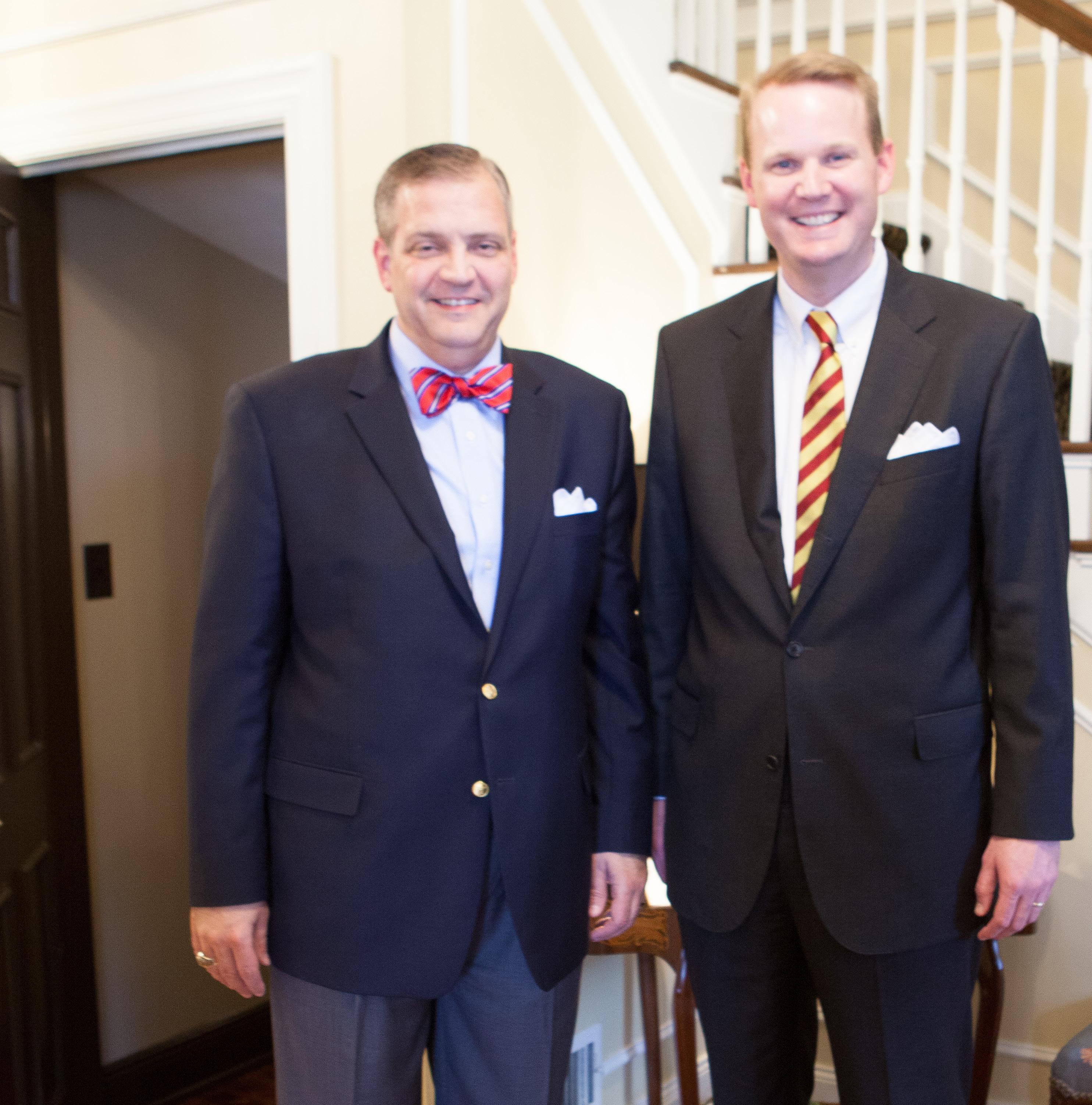
“

poses of God through the exercise of leadership among men and women who are faithful followers of Christ.
The best leaders are also understood as hinges in the turning of history. Henry Kissinger, who served as secretary of state of the United States during some of the most transformative years of the twentieth century, once stated: “Lead ership is most essential during periods of transition, when values and insti tutions are losing their relevance, and the outlines of a worthy future are in controversy.” Kissinger knew leadership firsthand as he had met over the course of decades with the most famous and powerful leaders on the planet. Our interests should be directed towards Kissinger’s understanding that a time of transition is the most important con text of leadership. In this sense, leaders are those who take charge during a tran sition, set a great work aright, and then lead faithful people into even greater and unprecedented levels of faithfulness.
This brings me to Jason K. Allen on the tenth anniversary of his election as president of Midwestern Baptist Theo logical Seminary. Jason Allen represents the qualities of leadership that make for greatness. Over the course of the last ten years, observers have certainly asked whether Jason Allen had been born for this role as president of Midwestern Baptist Theological Seminary or had
been made by his experiences and the context of serving an important theo logical institution at one of the most significant turning points in history.
In fact, Christians are those who un derstand that our sovereign God ac complishes both of these dimensions of leadership simultaneously—His timing is perfect in the birth of leaders, for they arrive at just the right time in human history. But God also makes leaders, and Scripture offers pervasive evidence of how leaders are made and forged in the crucible of a challenge.
Jason Allen arrived at Midwestern Semi nary as president at a time when the very existence of the institution was ques tioned. The future of the seminary was threatened, and these challenges came at the very time that the larger context of theological education and the communi ty of theological seminaries were expe riencing common strains and facing the headwinds of institutional challenges.
The leadership of Jason Allen at Mid western Seminary must be understood in multiple contexts. First, we consider his leadership at Midwestern Seminary. He walked into a situation in which few believed that a bold, flourishing, and exciting future existed for the institu tion. It was his vision, backed up with his administrative ability, fueled by his conviction, that provided the context
Leaders are those who take charge during a transition, set a great work aright, and then lead faithful people into even greater and unprecedented levels of faithfulness. ”
for the remarkable transformation that has taken place within the life of Midwestern Seminary.
As is often acknowledged, leadership requires vision. Jason Allen possessed the vision to see in Midwestern Seminary not only what those who were a part of the institution at the time could see, but what no one in the history of the seminary had ever seen. His vision for Midwestern was not that it be restored to a level of some stability, but that it be thrust into greatness.
Consider this: At the very time that most theolog ical institutions are in decline and in an age when the very existence of theological seminaries is be ing questioned (especially in the declining liberal mainline churches), Jason Allen saw an opportuni ty to forge an institution of greatness—an institu tion that would exceed most others in enrollment, influence, innovation, and faithfulness.
The three criteria of leadership that I consider to be most important—character, conviction, and courage—are demonstrated wonderfully in Jason Allen as a man and in President Allen’s leadership at Midwestern Seminary as an institution. I use the word institution intentionally, for leaders must understand that institutions are essential in the furtherance of mission and purpose. Institutions can last much longer than a human lifetime, and a succession of faithful leaders can produce an insti tution that will exert transformative influence not only through generations, but through centuries.
In the end, seminaries exist to serve the singular eternal institution, the Church of the Lord Jesus Christ. But as a servant to the Church, theological seminaries have a very important task. Jason Al len’s leadership at Midwestern Seminary is based upon his passion for that task and his ability to translate that passion into the hearts of others.
Those who are interested in leadership as tech nique will find the techniques of leadership in Ja son Allen and in superlative form. But there is no way to reduce the leadership of President Allen to technique. His passion is theological, and his lead ership is transformational, precisely because it is rooted in the gospel of Jesus Christ and in a pas sion to produce leaders who will teach and preach the Word of God until Jesus comes.
The Bible makes clear that leaders are human be ings, with all the frailties and limitations that come with being a part of sinful humanity. And leaders never stand alone. As the great British Prime Min ister Margaret Thatcher once remarked, “If you are so certain you are a leader, where are your followers?” The leadership of Jason Allen at Mid western Seminary must be put in the context of an institution that was ready for such a leader, and a community of leaders and learners and teachers who came together under his leadership to build a great institution, and to counter the declining theological vigor of the age with renewed convic tion and passion. The ultimate evidence of lead ership is the fact that true and powerful leaders
“The three criteria of leadership that I consider to be most important–character, conviction, and courage–are demonstrated wonderfully in Jason Allen as a man and in President Allen’s leadership at Midwestern Seminary as an institution.”
surround themselves with even younger leaders who will carry on a line of succession, and, we pray, will exceed us in faithfulness to Christ and in service to the Church in years to come.
You see this on the campus at Midwestern Sem inary, where you see leaders in the making, learning from leaders who are learners, who are able to communicate conviction and passion into the hearts and minds of others.
I must also note that the leadership of Jason Al len would be far less, and Jason Allen would be far less of a man, without the faithfulness of his wife, Karen. I say that as one who knows full well that my own dear wife has sacrificed more for the leadership to which I am called than I could ever sacrifice myself. On this tenth anniversary, it must be remembered that Jason Allen’s most important place of leadership is in his home, and that his wife and wonderful children have helped to propel him into the leadership that he has demonstrated so capably over the last ten years.
Are leaders made or born? In the providence of God, the only answer to this question is yes. At the same time, we are still astounded when God, for His glory, raises up leaders who demonstrate the very qualities of passion, joy, faithfulness, and enthusiasm that have marked Jason Allen during the decade he has served as the president of Midwestern Baptist Theological Seminary. Of all people on the planet, I’m among the least sur prised. I came to know Jason Allen when he was just a very young man and had just graduated from college. He came to Southern Seminary, fu eled with a passion to serve Christ. Recognizing his leadership ability, I was quick to bring him into the leadership ranks of this institution. We lost him to a worthy call as our sister school in Kansas City called him as president.
When God called Jason Allen to Midwestern Seminary, the man, the mission, and the moment combined.
We claim no responsibility for making Jason Al len the leader that he is, but we do count it a joy that we can celebrate his transformative lead ership at Midwestern Baptist Theological Semi nary. I am incredibly thankful for Jason Allen as colleague and as friend, and I look forward, God willing, to future service together in the great calling to which we have been called.
No one should underestimate the headwinds into which we are sailing. A secularizing age in an increasingly hostile environment to Christi anity underlines the urgency of our task at this hour. I’m thankful that Jason Allen stands at the helm of Midwestern Baptist Theological Sem inary, and I join Southern Baptists in looking with pride and thankfulness for the faithfulness of his service and the quality of his example.
DR. R. ALBERT MOHLER, JR. | President, The Southern Baptist Theological Seminary
“When God called Jason Allen to Midwestern Seminary , the man, the mission, and the moment combined.”
When it comes to discussing the building of a faculty at a confessional seminary and college, a vast vocabulary arises. For Midwestern Seminary and Spurgeon College, the words assembling and developing have been vital because the faculty here has always been strong.
The faculty hired between 1995-2012 are, in my mind, the heroes of our institutional story. These quality instructors carried out their work during a time of institutional chal lenge. Due to the faithfulness of these men and women, stu dents received a quality and enriched education, and many churches were strengthened as a result.
When Jason K. Allen arrived as president, he made clear that his key plan to revitalize the seminary was to retain and recruit faculty for the Church. Rather than recoiling, the faculty rejoiced. As he later said, “Who you hire will de termine the institution you lead and the type of graduates it will produce.” This streamlined vision allowed the facul ty to run in the direction they were trained, not having to chase trends and fads. The for the Church vision simplified things and allowed the faculty to prune the curriculum and replant degree programs, often in their entirety. Fac ulty members were encouraged to dream and think, and changes for the Church were empowered.
Thus, the assembling of new faculty came more often due to enrollment growth and out of desire to complement and support the existing faculty. Additions were made in areas to support a rapidly expanding doctoral program, as well as to communicate to our constituencies where Midwestern Seminary and Spurgeon College were headed. Addition af
ter addition showed that the seminary and college were now a place where people wanted to come to serve.
Besides assembling new faculty, internal clarity was needed in terms of how faculty could continue to de velop and progress in their profession. Before this time, there was ambiguity as to how a junior faculty member could succeed, gain promotion, and earn a sabbatical. Se nior faculty were unsure whether they were appreciated, still needed, or could finally be free and encouraged to write, not just teach as many classes as possible.
Thus, care and attention were given to reestablishing and abiding by simple policies and procedures for faculty service. Annual evaluations and opportunities for faculty development were instituted to discuss not only where a faculty member stood, but also where they wanted to go and what they wanted to do.
In time, both new faculty and longstanding faculty joy fully embraced the DNA that serving at Midwestern Seminary and Spurgeon College meant serving for the Church and for the Kingdom.
THE MIDWESTERN AND SPURGEON FACULTY DNA . From this era of assembly and development came a clear picture of what comprises the DNA of a Midwestern Seminary and Spurgeon College faculty member. President Allen enumerated certain quali ties in a 2018 article, “What I Look for When Hiring Faculty,” that gave a helpful description.
Midwestern and Spurgeon faculty have:
Cheerfulness & Collegiality Value Added Contributions
Yet, even though this list depicted the qualities of the faculty assembled and developed at Midwestern and Spurgeon, as President Allen put it, “Ultimately, you hire people, not prototypes. It’s not fair to expect per fection, but it is fair to expect fidelity, integrity, and the pursuit of excellence.” Thus, the full story of the genesis of this faculty’s DNA over the last decade is that it was built upon a culture of caring for faculty as people and working to create an environment in which those people can flourish.
Faculty are a unique people group—and, lightheart edly, I do emphasize the word unique. I say that not only because I am a faculty member, but also as a way of humanizing that which is often thought of as imper sonal and institutional. Fac ulty are human beings, not walking databases. Theologi cal educators are brothers and sisters in Christ, not props for the institution. As such, assembling and developing a faculty with certain qualities starts by seeing them as such.
Faculty are people who love learning and books, teaching and thinking. Faculty who are Christian theological educators love God, and the contribution they make helps others prepare to fulfill God’s calling on their lives. Yet, while carrying out their calling and profession, they are fathers and moth ers, sons and daughters. They need friends and fellow ship. They need the local church and pastors. They get sick, have bad days and good days, have fears and ambi tions, and, at the end of the day, want students to suc ceed and want to contribute to advancing the gospel.
ASSEMBLING AND DEVELOPING THE FACULTY OF THE FUTURE. As Midwestern and Spur geon enter a second decade for the Church and for the Kingdom, we continue to look to assemble and develop faculty. One way we do this is in the ongoing develop ment of Ph.D. students—seeking to share with them the Midwestern and Spurgeon faculty DNA as a part of their studies. So, no matter where they may find em ployment, they are equipped with a knowledge of what comprises quality and healthy faculty service.
When asked by Ph.D. students what we look for in a prospective faculty member, I relay a summary of the faculty DNA qualities above and then give them this list of virtues to cultivate so they might grow into that kind of a faculty member.
“Theological educators are brothers and sisters in Christ, not props for the institution. As such, assembling and developing a faculty with certain qualities starts by seeing them as such.”
The virtue of a heart for God and the gospel. How an institution assesses a prospective faculty member’s personal piety comes through discussing the centrali ty of God and the gospel in one’s life and thought. Thoughtful an swers to these questions allow the institution to see how one pro cesses essential doctrines versus non-essential doctrines as well as the priority and care for personal holiness and spiritual disciplines.
Therefore, when it came to assembling and develop ing a faculty at Midwestern Seminary and Spurgeon College, care had to be given for the people group called faculty while shaping expectations and revital izing faculty DNA and culture. If there is a secret to our faculty culture, that is it.
The virtue of publications and ac ademic presentations. How an institution assesses a prospective faculty member’s scholarship is best done with actual, not aspirational, material. This is not to say that there are no positions for recent graduates with few publications, but any kind of completed written work, whether book reviews or paper presentations, is useful in showing where the prospective faculty member is headed as a scholar. Fur ther, a track record of regular contributions can convey self-discipline, hunger for the work, and ingenuity.
The virtue of friends, personal and professional. How an institution assesses how a prospective faculty member might fit interpersonally and professionally
is strengthened by contact with knowledgeable and credible friends. There are many useful types of friend ships and contacts the prospective faculty member can share: professional friends that can speak to work ethic and collegiality, ministry friends that can elaborate on Christian living, and personal friends who can share about integrity and family life. Oftentimes, friendships form informal networks that make connections with an institution at several touch points and can serve the prospective faculty member well.
The virtue of understanding how institutions work. How an institution assesses a prospective faculty member’s contribution to more than academics begins when a faculty member shares a broader understanding of institutional life. Experiential or competent knowledge of the student recruitment process, how budgets work, and general organiza tional systems are all items of extra value for a pro spective faculty member.
The virtue of collegiality. How an institution assess es a prospective faculty member’s ability to serve and function as a part of a faculty starts with gener al temperament and interpersonal communication. Even the smallest or more casual comments con vey whether a prospective faculty member carries natural joy, is hopeful or pessimistic, veers toward cynicism, or delights too much in polemics.
The virtue of a willingness to serve. How an insti tution assesses a prospective faculty member’s hu mility and self-understanding comes through when presented opportunities for service. Is the prospec tive faculty member willing to consider adminis trative roles, start as an adjunct, or with part-time faculty service? Approaching an institution with re alistic expectations and a willingness to start where needed conveys a great deal about how that pro spective faculty member will handle greater oppor tunities or responsibilities.
The virtue of an online presence. How an institution learns more about a prospective faculty member first comes through a review of their online activi ty. This informal review can lead to the rejection of
the application of a well-credentialed individual because of a problematic online presence. How ever, a mature and genuine use of some social media or a personal website often serves to in carnate an application, helping an institution determine if they would like to take further steps to get to know the individual.
The virtue of patience. How an institution assesses the prospective faculty member’s ability to trust God, and those to whom he or she will report, is seen in how patient the prospective faculty mem ber is during the interview process. God’s ways are not always our ways; and openings, budget allo cations, and delays in communication can often lead to frustration. Patience in the present, prior to employment, shows a willingness to trust God and the institution in the future.
FACULTY FOR THE CHURCH AND FOR THE KINGDOM. As President Allen says, facul ty determine the direction of the institution and what types of graduates that institution will pro duce, which in turn affects the health of the local churches the institution serves.
Indeed, one of the blessings of celebrating 10 years of President Allen’s for the Church and for the King dom visions is to look back and see how Midwest ern Seminary and Spurgeon College’s faculty have contributed to and benefited from relationships with local churches as the churches carry out their Great Commission task. This is, after all, the great est marker of success in assembling and developing a faculty. By God’s grace, may it continue for an other decade and beyond.
JASON G. DUESING | Provost; Senior Vice President of Academic Administration; Professor of Historical Theology
And yet, it seems the greater risk is to deny the glorious reality that God uses people to accomplish kingdom purposes. This, after all, is the story of Scripture: God calling and commissioning sinners for His glory and the good of the world. Far from diminishing His glory, reflecting on the way God is using His people multiplies it.
For nearly sixty-five years, God has called, empowered, and gifted countless leaders at Midwestern Seminary and Spurgeon College. They come in all shapes and sizes. We have team mem bers from China, Chile, California, and from just down the road in Chillicothe, Missouri. If you were to join us for our all staff meeting, you would observe those with gray hair and others with what could only be described as wild hair. Some wearing a fresh ly-pressed suit with others showcasing their new Jordans.
But just beneath this display of diversity are striking similarities that I believe God has used to bless our institution over the past decade.
FIRST, OUR FACULTY AND STAFF ARE UNITED BY A SHARED VISION FOR THE CHURCH. I first heard that phrase in the Fall of 2012. Dr. Allen had been elected a few weeks prior and was beginning to triage things in Kansas City. Part of that early process was working with a design firm to help rebrand the school. During their first visit to campus, the firm took us to
I‘ve been asked to reflect on the team God has assembled here in Kansas City. I must admit that I approach this topic with mixed emotions.
Knowing that any progress we have made was God’s doing, I am hesitant to give anyone but Him credit.
breakfast to begin discussing a new vision for Mid western. A process that normally takes months and the help of countless advisors was over before our food arrived. While stirring his coffee, Dr. Allen calmly settled the matter:
It was clear our new vision was not up for discussion or debate. Though I did not realize it at the time, we had just made a decision that would inform count less others in the coming years.
The significance of this moment is not in Dr. Allen’s brilliance or foresight. The significance is in the authenticity and clarity of these foundational convictions. From the earliest days of his adminis tration, Dr. Allen knew who God was calling us to be and where God was calling us to go.
Ten years later, for the Church continues to inform our work and unify our community. We recruit students, donors, and ministry partners in light of these convictions. Our vision informs who we hire and which strategic opportunities we pursue. These convictions have encouraged faculty and staff to serve regional churches as pastors, dea cons, and ministry leaders. They have even shaped our curriculum, which is designed to equip those serving the local church. Chapel and conferences are both focused on modeling faithful exegesis and preparing future ministry leaders. Our resi dential and student life activities prioritize the local church. The content we produce is designed to engage, equip, and encourage those serving the Church. Indeed, it is difficult to reflect upon the past decade without acknowledging how God has used those three words— for the Church —to focus our work and enrich our fellowship.
SECOND, OUR FACULTY AND STAFF ARE UNITED BY SHARED VALUES . Over the past ten years, our administration has worked to artic ulate and reinforce a set of organizational values. Whereas our vision describes why we exist, these values articulate who we are and how we behave. Both are incredibly important and signs of God’s grace. Though these values have been expressed in differ ent ways over the years, we commonly define them as: Humble, Hungry, Smart, Happy, Hopeful.
Over the past ten years, I have watched God use these values to foster godly ambition, humility, hospitality, creativity, collaboration, peacemaking, innovation, resilience, and even courage.
ABOVE ALL ELSE, WE STRIVE TO BE A CHRIST-LIKE COMMUNITY MARKED BY HUMILITY. According to Tim Keller, “the essence of gospel-humility is not thinking more of myself or thinking less of myself, it is thinking of myself less.” That does not mean these individuals are insecure or ineffective. Quite the opposite, they recognize that God has given them pronounced gifts and weak nesses. In the case of both, others are the focus. Their strengths exist to serve others and their weaknesses are an invitation to depend on God and the strengths of others. Humble team members also assume the best of others and are willing to “sweep floors” to support the team and get the job done.
Humble team members are folks like Midwestern’s Director of Campus Operations Skye Singleton. Over the years, I have observed Skye’s humility in countless ways. Despite holding a significant leadership role, I have seen Skye cheerfully pick up trash, solve prob lems he did not create, fulfill last minute requests, and go the extra mile for anyone that asked. I am convinced that God has blessed our institution, in part, through the Christ-like humility and service of men and women like Skye Singleton.
“From the earliest days of his administration, Dr. Allen knew who God was calling us to be and where God was calling us to go.”
THE PEOPLE OF MIDWESTERN ALSO STRIVE TO BE HUNGRY. According to our values, hungry team members are passionate about progress and eager to leverage their gifts to serve the greater good.
They are continuously moving forward, innovating, and improving. Hungry team members are deter mined, self-motivated, and eager to take ownership.
Hungry team members are leaders like Grace Pike. A recent graduate and new member of the commu nications team, Grace takes great pride in advancing our social media and content strategies. She is constantly researching her field, trying new things, and submitting proposals to advance our work. Without individuals like Grace who are hungry for Godward progress, institutions grow stagnant and eventually fail to accomplish all that God has for them.
MIDWESTERNERS ALSO STRIVE TO BE SMART. Yes, we have highly intelligent people on our team, but this institutional value prioritizes relational intel ligence. Smart team members seek to understand people and projects. They naturally see and appre ciate underlying relational dynamics, allowing them to develop solutions and effectively serve others. As for projects, smart team members intu itively connect dots, see the big picture, and look for creative solutions to challenges. They ask lots of questions and assume there is almost always a better way to do something.
Midwestern’s Registrar, Jared Kathcart, is one of the smartest leaders I know. Yes, he is actually brilliant, but more than that, he has a tremendous gift for balancing people and projects. Jared anticipates questions, con textualizes his answers, and rarely loses sight of the big picture. As a result, Jared and countless others like him are among our greatest assets.
FINALLY, WE STRIVE TO BE LEADERS WHO ARE HAPPY AND HOPEFUL. These leaders are kind, encouraging, and optimistic. They engage people and projects with a joyful heart and attitude to serve. They assume the best of others, are fun to be around, and do not take themselves too seriously. Crucially, these team members are committed to hope and optimism. Yes, they are realistic, but they are also determined to be a voice of joy and courage.
Taylor DiRoberto is one of the most contagious leaders I know. He is relentlessly optimistic and eager to tackle whatever you put before him. Just this morning I was in a meeting with about twenty other members of our faculty and staff. As much as I love what we do, this particular meeting was rather uninspiring (I was lead ing it!). During the meeting I looked across the room and saw Taylor sitting up in his chair, nodding along with the speaker, taking notes, and smiling. Taylor was happy and hopeful about our work. As a result, others were too.
In the grand scheme of things, ten years is not that long. But it is long enough to see God’s gracious hand on our work. I am convinced that God has blessed our institution, in part, because we have a community of humble, hungry, smart, happy, and hopeful saints laboring together for the Church. What a gift of grace.
May God give us the courage to recommit ourselves to these ends until He returns.
CHARLES W. SMITH, JR. | Senior Vice President for Institutional Relations; Assistant Professor of Christian Leadership
“In the grand scheme of things, ten years is not long. But it is long enough to see God’s gracious hand on our work.”
Akey lesson from the renaissance of Midwestern Seminary is that a healthy administration lays the foundation for a healthy institution by creating a robust and sustainable busi ness model. Dr. Allen described this when he became President, and the last decade has borne out this truth. The renaissance our institution has experienced has in deed touched every square inch of the campus. Herein I endeavor to provide an insider’s perspective on how a healthy administration relates to a healthy insti tution by giving an account of how such a foundation is laid, interwoven with a first-person account of how it happened at Midwestern Seminary.
An institution is an organization pursuing a God-given mission in Christ-honoring ways. This definition is faithful to Scrip ture, sensitive to our cultural context, and consistent with social-scientific approach es to social institutions. Every organization
is shaped by purpose, elements, and inter connections. Our purpose at Midwest ern—our God-given mission—is to serve the church by biblically educating Godcalled men and women to be and make disciples of Jesus Christ. The elements of our organization include faculty, staff, stu dents, classrooms, dorm rooms, a wifi net work, white boards, and more. Intercon nections are all the complex ways in which we interact to achieve our purpose—all of which we intend to be Christ-honoring.
The responsibility of administration is to coherently organize the elements and interactions of the organization to maximize effectiveness in achieving its purpose. Put another way, the role of administration is to create positive feedback loops, uniting elements and interconnections in ways that multi ply our impact as we seek to fulfill our God-given mission.
“Midwestern Seminary must settle for nothing less than a renewed and distinctive vision for theological education, operating within a robust and sustainable business model.… A viable business model touches every square inch of the campus; from efficiencies in business affairs to excellence in advancement and enrollment management.”
— Dr. Jason K. Allen, 2012
I joined Midwestern to lead Institutional Ad ministration during the Summer of 2017, at the chronological midpoint of the last decade of growth. For the last ten years, Midwestern has been one of the fastest growing educational in stitutions in the United States, growing from just over 1,000 students and $10 million in revenue during the 2011-12 academic year to almost 5,000 students and $33 million in revenue at the end of the 2021-22 academic year.
Extraordinary growth was a blessing that trans formed the institution in countless ways, many of which we celebrate in this issue. But growth also exerted pressure on the foundations of the insti tution. Midwestern needed a robust and sustain able business model—one that stewarded all ele ments and interconnections with utmost wisdom.
of men and women who embody this identity, eagerly serving students, faculty, and other staff so as to multiply their ministries.
In view of what administration is, I aspired for two values to shape our divisional culture: best ideas and neighborly love. These two values guide how we organize the elements and inter actions of our organization to maximize effec tiveness in achieving our God-given mission.
At the most basic level, best ideas guide what we do and neighborly love guides how we do it. We seek to discern and implement the wisest means by which to organize our institution (best ideas) and we interact with one another and with those we serve by loving them as we love ourselves
In view of its role in the institution, I aspired for Institutional Administration to develop an identity as the “towel & basin division” (John 13). This is on account of our calling to do the often inglorious and sometimes even dirty work that enables others to fulfill their callings. For members of our Grounds Team, Custodial Team, and others, the dirty work is quite literal! For everyone else in Institutional Administration, the towel and basin is a metaphor for humble service across our campus to support the work of others. Today I am privileged to lead a team
(neighborly love). We seek to be good stewards and to serve others by doing for them what we would want done for us, were we in their posi tion. This is how we contribute to Midwestern’s God-given mission in a Christ-honoring way.
But these values have an even deeper signifi cance, for their impact extends beyond what we do on our campus. As administrators, good stewardship undertaken in a way that loves one’s neighbor is loving God with our minds. And good stewardship is not only a means of loving our neighbor nearby, but also far away. In
“In view of what administration is, I aspired for two values to shape our divisional culture: best ideas and neighborly love.”
exercising good stewardship, we are loving the churches and church members that partner with us through the Cooperative Program as well as those that will be impacted by our graduates’ ministries. These values, then, compel us ulti mately toward love of God and neighbor.
Guided by this identity and these values, we en acted a strategy to direct our work. We have con sistently applied a paradigm designed to stew ard the elements and interconnections of our organization wisely: process, technology, better people, more people. We have focused first on creating processes: intentional, thoughtful, and repeatable ways of performing necessary and re curring tasks or functions. With processes estab lished, we have sought to implement technology: to develop and deploy technological solutions that make the established processes efficient and scalable. With respect to personnel, we have consistently striven to employ better people in every position: to invest in the professional de velopment of existing staff and to attract pro fessionals who would enhance our team. Finally, when the benefit from improvements in process and technology and investments in our existing team have been fully realized, we have added a few more people where they were essential to improving our effectiveness and efficiency.
A healthy administration lays the foundation for a healthy institution by providing the nec essary elements, designing interactions, and coordinating both in a manner that multiplies the institution’s effectiveness in achieving its God-given mission—that is, by building a ro bust and sustainable business model. Of course, much more is required for an institution to be healthy. But given what administration is and does, it is nearly impossible to have a healthy
institution without a healthy administration serving and leading it.
Given their innate interdependence, the health and achievement of any one area of an organization depends significantly on the health and achieve ment of others. Compliments and congratulations properly go all around. In this issue of The Mid western Magazine, my colleagues have celebrated achievement in building our faculty and building our team. Herein, I would like to celebrate achieve ment in building our institution, beginning with achievements in Institutional Administration and extending to achievements that result from our shared stewardship of the institution.
An efficacious administration. A healthy adminis tration is effective in discharging its responsibili ties. Effectiveness is observed directly in Institu tional Administration: we have implemented best business practices, enhanced care for our physical and digital spaces, and improved service to the faculty, staff, and students who depended on us, all of which has led to tangible operational results. Effectiveness is also observed indirectly in our in stitution, in many of the ways that follow.
An efficient administration . A healthy adminis tration is efficient in its use of resources. Con sistent application of our operating strategy has made our division not only effective, but also efficient; we have built a lean and cost-effective organization. Based on the most recent data, we lead our peers in cost-efficiency. We adminis trate effectively at a cost that is 53% lower than our peer average per student (full-time equiva lent); and institutionally, we provide high-qual ity education at a total cost that is 41% lower than our peer average.
A reproducing administration. A healthy admin istration reproduces itself. Our focus on better people—on investing in our team—has made us
a division that produces leaders. Seven of the nine individuals who lead the departments and auxiliaries within Institutional Administration have been hired, developed, and promoted into their leadership role. This emphasis on professional and leadership devel opment not only provides the key leaders we need to thrive, but it also preserves the identity, values, and strategies we have developed in our division.
A financially healthy institution. A healthy administra tion leads the organization to financial health. Apart from generous financial gifts from donors, an organiza tion becomes financially healthy only as positive annu al operating results and investment returns compound over time into financial strength. Over the last decade, Midwestern has been both the beneficiary of generous donors and has operated with increasingly positive operating results that have bolstered its endowment, transforming it into a financially healthy institution.
For the 2012 academic year, Midwestern budgeted to break-even, estimating just under $10 million in rev enue and expenses. At the end of the 2012 academ ic year, Midwestern had $23 million in net assets, of which only $6 million was endowment or cash. For the 2022 academic year, we budgeted for just under $30 million in revenue and $21 million in expenses; our budget called for (and we achieved) a positive op erating margin of $9 million, which was earmarked to build our endowment and fund necessary capital projects. At the end of the 2022 academic year, we had $79 million in net assets, of which $35 million was en dowment or cash. The fruit of compounded positive annual results has been financial health: net assets more than tripled and cash and endowment increased six-fold. Soli Deo gloria.
A robust business model. A healthy administration builds a robust business model; this is the founda tion it lays. Coherently organizing the elements and interactions of the organization to maximize its ef fectiveness in achieving its purpose leads to a robust business model. A robust business model is thus a result of the foregoing: an efficacious and efficient operating model combined with a prudent financing model creates a robust business model. And a robust
business model provides many advantages for the in stitution; it touches every area of the campus.
An agile organization A robust business model pro vides the agility to capitalize on new opportunities and to respond to challenges from the ever-changing environment in which we exist. It does so by provid ing the operational capabilities and financial margin to defend against threats and to invest strategically in opportunities. Countless successful investments in Institutional Relations and in Academics over the last decade testify to the value of this agility. Examples in clude the Timothy Track, in which masters students gain hands-on ministry experience as apprentices in local churches; the For the Church Institute, which takes theological education to local churches around the globe; Spurgeon College athletics, which now has four competitive intervarsity teams; and countless new undergraduate majors, graduate emphases, and doctoral fields of study that have expanded the ways we biblically educate God-called men and women.
An affordable education for students. A robust busi ness model enables us to provide affordable educa tion to our students. We desire to train ministers for the Church at a cost that enables them to launch into ministry with little or no educational debt resulting from their education at Midwestern. In order to do this, we build into our business model the expecta tion that tuition, fees, and auxiliary costs will be af fordable to students. This commitment, combined with the generosity of the Cooperative Program and the strength of other components of the business model, has enabled us to continue providing an af fordable education while investing in new initiatives and renewing our campus.
A renewed campus. A robust business model enables us to care well for our physical spaces. Over the last de cade, Midwestern has spent over $45 million to build or renovate campus facilities and housing. These invest ments have impacted every building on our campus.
The first major project was the renovation of what is now known as the Berquist Administration Build ing and the construction of Jenkins Hall, completed
in 2015. Jenkins Hall is named in honor of Bill and Connie Jenkins, whose generosity enabled the project. The project provided modernized facilities for the President’s Of fice, the Communications Office, and other administrators. It also provided for the cre ation of the Spurgeon Library—a permanent home for Charles Spurgeon’s personal collec tion and a research center around it. Also in 2015, the Administration began a program to renovate all campus housing, starting with the long outdated campus apartments.
In the spring of 2017, we broke ground on a new building to be known as the Mathena Student Center, named in honor the Math ena family in appreciation for their gener ous lead gift toward the project. Completed and dedicated during the fall of 2018, the Student Center added 40,000 square-feet of space for a new cafeteria, coffee shop, book store, offices, recreation area, gymnasium, and fitness facility, as well as new formal spaces for the Presidential Dining Room and President’s Reception Room.
In 2018, while constructing the Mathena Student Center, we renovated the 28,000 square-foot Trustees Building to create new faculty offices, a new student services cen ter, and modernized classrooms. This ren ovation significantly enhanced the campus community by relocating our faculty to the Main Campus and by providing a new, cen tral location for all student services.
Growth in the residential population of Spurgeon College and in our Global Campus and Asian Studies programs necessitated two renovation projects on our North Campus during the Summer of 2019. That summer we converted 10,000 square-feet of office space to a men’s dormitory for Spurgeon College and renovated 7,000 square-feet of unoccu pied office space to accommodate our Global Campus and Asian Studies programs.
During the summer of 2020, we renovat ed the last outdated building on our Main Campus: our campus library. Now known as the Mark T. Coppenger Library, the ren ovation modernized the library in both form and function and created new space for our growing research centers, residential doctor al programs, and institutional archives.
With the library renovated, our Main Cam pus has been fully modernized. Our North Campus has been renovated and repur posed to new use. And in Campus Housing, all of our apartments have been renovated. Only two major buildings remain with sig nificant deferred maintenance: the under graduate dormitory and the Vivion Home. Renovation of both buildings began this spring, and we anticipate the completion of both next summer. By God’s grace, and through the means of generous donors and effective administrative stewardship, our campus has been renewed. As of next summer, every permanent building on our campus will have been constructed or reno vated, all without incurring long-term debt.
A healthy administration lays the foundation for a healthy institution by building a robust, sustainable business model. Our robust, sus tainable business model has, indeed, touched every square inch of our campus. Both literal ly and metaphorically, it has laid the founda tion for the renaissance of our institution.
JAMES J. KRAGENBRING | Senior Vice Pres ident for Institutional Administration; Assistant Professor of Business and Christian Studies
In the fall of 2021, I stepped on the grounds of Mid western Baptist Theological Seminary to lead a workshop at the annual For The Church National Conference. While on campus, I toured the awe-in spiring Spurgeon Library before walking across campus to visit the new Mathena Student Center— the highest quality student center I have ever seen on a seminary campus. These state-of-the-art facilities are a far cry from the time Dr. Jason Allen had his first interview as a presidential candidate at Midwestern. At that time, by his own words, “the campus was so unappealing that the trustees didn’t even meet at the seminary but rather at a nearby hotel.” The man interviewed off campus was soon named the Pres ident, and as the old clichè goes, the rest is history.
Today, Midwestern Seminary is much more than a collection of significantly upgraded facilities. It is a vibrant seminary with a clear vision and mission of being for the Church. The revitalization of this South ern Baptist seminary in Kansas City is a story that needs to be told—and there is no one better to take on the task than the one God appointed and used to lead the turnaround, Jason K. Allen.
In fact, Allen’s 10 years at Midwestern is the story of his appropriately titled leadership book, “Turn around.” This reflective and insightful leadership book uses the first decade of Allen’s presidential
tenure to teach leadership principles that Allen insti tuted and developed in leading Midwestern Seminary to be for the Church
This is a book by a practitioner, not a theorist—all based on the foundational belief that leadership is a stewardship. Allen makes clear to leaders and future leaders reading this story that “your convictions are what you believe, your mission is why you exist, and your vision is where you’re going.” Those three words—conviction, mission, and vision—have been the foundation of what we have seen come into real ity in Kansas City over the last decade.
The ten chapters of the book explain ten different realties implemented and developed by Allen and his team that led to the turnaround of the Midwestern Baptist Theological Seminary we know today.
Among the ten focuses of the Midwestern story that resonated with me the most, as both an onlooker and alumnus, was Allen’s insistence that the institution must “define the mission.” The mission Allen insti tuted flowed from his convictions, now known as “three simple, but powerful, words: for the Church.”
“Those three words are why we exist,” writes Allen. “ For the Church is more than our mission statement—it’s our mission.” Being for local
churches should be the reason seminary exists, as it is literally the training ground for service in church leadership, especially pastoral ministry, and the mission of Mid western removes all doubt.
In honoring those who came before him, Allen acknowledges that there “were faith ful men and women already serving for the Church,” but clarifying the mission brought about “leveraging all the seminary’s resources for the Church in a way that hadn’t been done before.” A clearly defined mission has certainly brought about action from Midwestern Sem inary. A clear and right mission statement, Allen writes, “will unite your organization. The mission will draw you forward, magnet ically pulling your team together.”
Another aspect of Jason Allen’s leadership covered in Turnaround is the significance of the team a leader puts into place. He writes, “Essential to our institutional success is the team we’ve assembled.”

For anyone even casually familiar with Midwestern Seminary today, that statement from the President is undeniably obvious. The staff and faculty are respected across our network of churches in the Southern Baptist Convention, and Dr. Allen is quick to note and pass on credit for this great seminary story.
A common factor I have with friends who work at the seminary, beyond a newfound affection for the Kansas City Chiefs and Royals, is a respect for Jason Allen as a man and as a leader. Allen encourages leaders to “nurture your team, cultivate their strengths, forgive their short falls, and honor their families.” I never hear of anyone on the team at Midwestern being in a hurry to leave Kansas City for a new ministry position.
There was a time not long ago when Midwestern Seminary was an afterthought and not a very coveted destination. What has happened in just a decade to turn around the seminary is nothing short of remarkable. If I were only allowed to point to one thing that changed the game in Kansas City, it would be culture.
Allen writes that “an organization’s culture is more detected than documented, more overheard than
heard, more sensed than seen. If an organization’s cul ture is healthy, you’ll likely know it. If it’s unhealthy, you definitely will.”
The use of the word “detected” stood out to me as I think back on the last ten years of Midwestern Seminary. With out any knowledge of what has taking place on campus, many Southern Baptists like myself began asking, “What in the world is happening at Midwestern?” Even though we didn’t have enough information in the early days to place our finger on it, it was undeniable something was happening. That something, we would come to find out, was convictional and visionary leadership.
Jason K. Allen has shown us that religious institutions can be turned around. The for the Church mission has moved far past being detected. It is now realized and celebrated. I am proud to be associated with this vibrant and dynamic seminary under the leadership of Dr. Jason Allen. May our pastors and missionaries be for the Church as a result of his stewardship.
DEAN INSERRA | Founding and Lead Pastor of City Church in Tallahasse, FLI believe that any parachurch organization or min istry should be evaluated primarily based upon its faithfulness to serve, support, and strengthen the local church. Christ has promised to build His church, not His seminary. But as we are faithful to His Church, doubtlessly He will build this seminary.
Over the past decade, we’ve trumpeted our for the church mission as loudly as we can. It’s been imple mented across every square inch of the campus, embedded into every aspect of our institutional programming and curriculum, and embraced by every member of the team.
We believe that Midwestern Seminary’s right to exist is directly tethered to our faithfulness to the local church.
Moreover, for the church has given us institu tional momentum.
It’s been an igniter, a propellant moving us forward, and it’s galvanized our constituency to support us. It’s been a cohesive, binding us together. We are for the church.
ARTICULATING THE MISSION. Ordinarily a mission statement should not change with a new leader. Perhaps it’s tweaked or reapplied, but it ought not be reinvented with each lead ership change. In a sense, I was blessed because Midwestern Seminary had already been serv ing the church, but it had not expressed that mission in a clear, cogent way. I had the oppor tunity to clarify, to convey, and every day since, to champion that mission.
When Winston Churchill was heralded as the lionhearted leader of wartime Great Britain, he famously said, “It was a nation and a race dwell ing all around the globe that had the lion heart. I had the luck to be called upon to give the roar.”[1]
I feel the same way toward Midwestern Semi nary’s for the Church mission. Before me were faithful men and women already serving for the church. Yet, like Churchill, I’ve had the pleasure of articulating that mission and leveraging all the seminary’s resources for the church in a way that hadn’t been done before.
At the personal level, for the church had been building in my life for years. I had twin loves, the local church and theological education. In fact, that’s why I’d been dually engaged in insti tutional and local-church ministry settings for almost my entire adult life.
But the for the church mission is so much bigger and better than I am. It’s not just autobiograph ical; it’s biblical.
THE UNCHANGING MISSION. Over the past ten years, I’ve watched with pleasure as for the
Church has gone from being my mission state ment for Midwestern Seminary, to our mission statement for Midwestern Seminary, to the mis sion statement of Midwestern Seminary.
There is a symbiotic relationship between the church and the seminary; they are to serve, strengthen, and support one another. With the previous generation of pastors retiring, churches are asking, “From whence will a new generation come?” Midwestern Seminary must be ready to respond to that question every year going forward by supplying a new generation of pastors, mission aries, and ministers to serve our churches.
This is precisely why for the Church still matters. Our mission has not changed. Our constituency has not changed. Our directive from the Lord has not changed. Therefore, we will continue to be for the Church because our calling is clear, and the need is great.
For the church animates our team, represents our institution, and inspires our constituency. Together, we are for the church, and we always will be.
*This article is an excerpt from Turnaround: The Remarkable Story of an Institutional Transforma tion and the 10 Essential Principles and Practices that Made It Happen. To purchase the book, please visit: jasonkallen.com.
[1] This line was said in a speech of thanks given at the House of Commons on Churchill’s eightieth birthday on November 30, 1954. See Geoffrey Best, Churchill: A Study in Greatness (Oxford: Oxford University Press, 2003), 183.
There are certain people who you never forget the first time you meet them. Upon first impression, you quickly perceive they have an intangible qual ity that captures your attention. They project a vibrant countenance that shines through them. This noticeable confidence causes them to stand out in a crowd and immediately distinguishes them from the rest.
Jason Allen was such a person the very first time I met him. At the time, he was a nineteen-year-old college student going on twenty, and I was the pastor of Dauphin Way Baptist Church in Mobile, Alabama. I will never forget when this tall and hand some young man walked into my office. He was an athletic college basketball player who looked like he had been chiseled out of marble.
Jason came striding into my study for the visitor’s reception being held there. The room was packed with people who were gathered to meet me and
learn more about the church. There he was in the midst of this church gathering, standing out like a towering mountain.
Each of the people around the room introduced themselves. When Jason’s turn arrived, he introduced himself and said that I had come to Mobile perhaps just for him. It was not a cocky statement, but one of immense self-confidence, that God was preparing him for something bigger. Even as a young man, he seemed to have a sense of destiny about his life.
Over the next several months, Jason became so filled with the Word of God that he realized he must quit the basketball team and pursue minis try in a more focused way. More specifically, he wanted to help me in my pastoral duties, an offer I immediately accepted. We had no more room in the church building for another office, so I had sheetrock walls put up in my office to make a new space for him. We hired Jason part-time and then full-time to be my pastoral assistant. Though
he was only in his early twenties, he already showed the initiative to step into full-time ministry.
In this new role, he organized out reach efforts to follow up with church visitors, as well as led a team of people to pursue other individu als. He demonstrated a forward drive that was propelling him to do the work of God. Never a passive specta tor, Jason was always moving ahead.
On one occasion, he said to me, “I want you to be able to say that I was the best employee you ever hired.”
That represents his heartfelt commit ment to hard work and his pursuit of excellence. In response to that desire, Jason would certainly be on that short list of the most productive people who have ever served alongside me.
Jason became an avid, even voracious reader of theology, Christian biogra phies, and Bible commentaries. The fact that he was on a limited budget did not slow him down. Every time I walked into my study, he had pulled out onto the edge of the shelf every double copy of a book that I owned. It was his less than subtle way of let ting me know that I should donate it to his ever increasing collection of my library. Soon, my extra British regimental ties and fountain pens were being passed along into his personal possession as well.
In time, I had the privilege of perform ing the wedding ceremony for Jason and his beautiful bride, Karen. I well remember that she came down the center aisle to the organ playing at full throttle, “A Mighty Fortress.” This
Reformation hymn would prove to be a harbinger of Jason’s future ministry.
When it came time for Jason to go to seminary, Jason chose to attend The Southern Baptist Theological Sem inary. The Sunday before he left for school, we recognized him at the end of a worship service by commissioning him to seminary. As he left, I knew a great future lay ahead for him. I was convinced that he would end up being either the president of that seminary or whatever other school would see his giftedness. I recognized that God had laid out a special path for him, and he was stepping forward to pursue it.
While at Southern Seminary, Jason caught the eye of the school’s Presi dent, Dr. Albert Mohler, who wisely drew him into his executive office
to work for him. While studying for his Ph.D. at Southern, Jason was given more institutional expe rience of different capacities. All this exposure was preparing him to demonstrate leadership on a larger platform for whatever God had in store for him. In reality, Jason Allen was becoming Jason Allen. I knew his days would be numbered at Southern until another Christian institution would contact him and call upon him to guide it into the future.
That school proved to be Midwestern Seminary. When they reached out to Jason, he called me and asked for my coun sel. I told him that it was obvious God had been preparing him for such a time as this. After a few interviews, Jason clearly showed himself to be head-and-shoulders above the other candidates. The search committee rec ognized what I knew all along: Jason was a man with exceptional leader ship abilities. He was the perfect man for the position, long prepared and precisely fitted for this new challenge.
answer is: exactly as he has responded elsewhere in his life and ministry. He would pursue it with wholehearted commitment until the work is done, a journey he explores in his book Turnaround. As he writes about this at length, Dr. Allen firmly believes in the foundations of faithfulness to Scripture, godly convictions, and tenacity of resolve.
He was the perfect man for the position, long prepared and precisely fitted for this new challenge.
Ten years later, the success of his labors is evident to all. Granted, there is still work to be done at this distinguished institution. There is much progress yet to be made. But if what has been accomplished over the last decade is any indication of the future, there is an even brighter tomor row on the horizon.
Many years ago, I knew that this day would come for Dr. Jason K. Allen. A day when he would be the president of a prospering seminary and an expanding Bible college. A day in which he would see much fruit from his leadership efforts. The essential ingredients for this day were evidenced long ago, when a young nineteen-year-old college basketball player came walking into my office with enormous potential draped on his broad shoulders.
Soon, the trustees of Midwestern Seminary announced Jason to be its next president, a call which he readily accepted. With this new assign ment, he was handed the opportunity, and challenge, of his life. How would he take the helm of a floundering seminary and turn it around? The
No one is surprised that this success has come. Certainly not me.
STEVEN J. LAWSON | Founder and President of OnePassion MinistriesCOME STUDY for the Church mbts.eduby JARED C. WILSON

It’s my great privilege to serve as the Gen eral Editor of For The Church, which is the result of years of praying, planning, and faithful contributions from some great writers. The opportunity to serve the Church through the gospel-centered resources you find at ftc.co was a huge part of the draw for me to relocate to Kansas City and join the team at Midwestern Seminary. Our hope has always been that what we provide through the site will benefit the institution, sure, but more than that, we hon estly and humbly hope to simply nourish those who visit these pages—whether as part of their regular web surfing or through individual clicks on articles that intrigue them via social media—with the incomparable encouragement of the finished work of Christ.
At the FTC site, one can find fresh content daily from some very talented writers from all over the world, all aimed at helping pastors and lay leaders press the gospel into every corner of the room, so to speak. While we hope to explore how the good news of Jesus applies to all of life—because it does!—we are more primarily aiming at ministry leaders and influencers, whether you’re a senior pastor or a youth pastor, a Sunday School teacher or a stay-at-home mom. For The Church is for you.
There are lots of Christian websites out there vying for your valuable attention, including a growing number of gospel-centered resource sites (thank God!). You will notice that there is a lot about our site that is similar to
others you already enjoy, and we look forward to join ing them in your daily work of edification online. But we hope you will also notice a few things that make For The Church unique. We have put a lot of thought into how we might complement what is already valu able in the evangelical blogosphere. And while the following four aims are not exclusive to our site, we nevertheless make these commitments to you. Please know that, for us, being for the Church means being:
We affirm the sufficiency and the authority of the Bible. We certainly do affirm the oft-re peated dictum that “all truth is God’s truth,” but we more strongly affirm Paul’s word that “All Scripture is breathed out by God and profitable for teaching, for reproof, for correction, and for training in righteousness, that the man of God may be complete, equipped for every good work” (2 Tim. 3:16-17).
Since you cannot improve upon “complete,” we will stick with the only truth that is power to change and sustain hearts in Christ Jesus—the inerrant, infallible Word of God.
In these days of increasingly murky cultural waters, we know there can be a greater temptation for the Church to argue on the world’s terms, to debate according to the logic of the spirit of the age, and to fall into so-called culture wars and the like. We believe the gospel has implications and applications for every calling and vocation, so of course Christ the King is King over things like politics and culture. But when For The Church speaks into those arenas, it will do so with the unchanging Scriptures. By holding firmly to the biblical truth, we maintain the great strength and advantage of clarity in dark days.
And ultimately, to be for the truth is to be for the glory of Christ, who is the Truth.
You may notice that we spend quite a bit of time on the devotional side of things. This is an inten tional effort on our part to speak as much to the hearts of our readers as to their minds and hands. We are making a significant commit ment to exulting in the grace of God in our daily offerings. We believe that by focusing on devotional pieces, we can daily nourish our readers with the truths of God’s Word and help them exult in Christ. But we also want to feature practical articles as well. Even these, however, will not be purely “how to” exercises, but “why to” pieces—meaning, we will do our best to root our exhor tations and instructions in the finished work of Christ and the good news of His perfect obedience imputed to us by faith. For this reason, we work to be practical, not pragmatic. To be practical is to help you flesh the faith out. To be pragmatic is to make the faith formulaic. We do not believe the latter serves Christ’s sheep well. We want them to be well-fed with the grace of God.
We make no apology about emphasizing resources aimed at those in ministry or aspiring to ministry. You will see that most of the posts appearing here are written with pastors, pastors-in-training, and mature lay leaders in mind. We do this because we believe
We work to be practical, not pragmatic. To be practical is to help you flesh the faith out. To be pragmatic is to make the faith formulaic.
that whatever a church’s leaders are, the church becomes. So we will help shape churches by shap ing their leaders. To be for shepherds is to be for the sheep, actually. And by speaking to pastoral hearts with the gospel and strengthening their minds and hands with helpful content aimed at fulfilling their calling to equip the saints for ministry, we will honor the Good Shepherd by honoring His undershepherds.
In all that we do, we seek the magnification of Christ in the Church and in the world through the Church. This means we must lash ourselves to the mast of the ship of the gospel. Where it goes, we will go. We will not depart from Christ’s good news, because the Spirit working in and through the gospel is what has made the Church in the first place. To be for the Church means being intently, persistently, stubbornly, and eternally for the gospel, because the Spirit working in and through the gospel is what sustains and sanctifies the Church.
The gospel is the only power stewarded to the Church and it is the only hope for a lost and dying world. So
that’s For The Church. We’re unapologetically for the gospel, because we will be celebrating the gospel well
into eternity’s endless days, for the expansion of the glory of the Lamb who was slain.
JARED C. WILSON | Assistant Professor of Pasto ral Ministry; Author-in-Residence; General Editor, For The Church
“IN ALL THAT WE DO, WE SEEK THE MAGNIFICATION OF CHRIST IN THE CHURCH AND IN THE WORLD THROUGH THE CHURCH.”
“The Gospel is the only power stewarded to the Church and it is the only hope for a lost and dying world.”
In this edition of the Midwestern Magazine , we wanted to celebrate God’s faith fulness through the For The Church resource site by highlighting the most popular article in FTC history. From its inception, the FTC site seeks to encourage the local church through gospel-centered content. While gospel-centered encouragement has always been the goal, we’ve been blessed to highlight many excellent writers as well. Andrea Burke is one of these great writers who regularly contributes to the FTC site. In fact, Andrea’s article, “The One Life Dream That Makes a Girl Blush,” is the most read article in FTC history! We’re grateful for how the Lord has used this article in the lives of so many and hope many more are encouraged through meeting one of the great writers at For The Church.
Because of my work, I sit down regularly with single, young women. Single young women who want noth ing more than a wedding ring, the kids, the house, the whole lot. And mind you, their wishes are never wicked or wrong. What they desire is not evil. What they hope for isn’t silly. They are not glassy-eyed about their future. They are not sitting across from me wondering where Prince Charming is. They are faithful young women. Hard-working. Funny. Beau tiful. Smart. And they have done well to steward what they have up to this point.
And yet, I see it. When the water is poured again and they lean back after a dish is served to their friends. When they take a breath and their shoulders slump a little. After they’ve told me all of they’ve said of their current life, their work, their time, their goals. They don’t want to say it, for fear that admitting it will make them look weak.
“I know it’s silly,” one girl said. “I know. But…” she hesitated, tucking a strand of hair behind her ear. “I really just want to be married. To raise some kids. To take care of a home.” She’s almost embarrassed by the time she’s finished saying the sentiment. As if admit ting it has made any impressive strength and wit she had faded away into a pile of proverbial laundry and dishes. As if she’s ashamed for wanting something so “trivial” and simple. “Is that silly? I mean, it’s really all I really want to do.”
We’ve gone so far down the road of feminism that we’ve forgotten how to proudly be feminine. You want to carry a child in your bones and lay down your life for them for more than 18 years? You want to lay down your life and learn to die to self for the rest of your life? You want to serve someone with all your heart, body, and soul? You want to master the art of cooking for a crowd and have clean clothes and end each day knowing that there’s a group of people who look to you as one of their anchors and rocks? You want to work your tired body from dawn to dusk for love?
How silly it is not. How trivial is no way to describe it.
I wish we loved the strength it takes for a woman to become a wife and a mother. We marvel at her physical strength when she births a child. But we forget what invisible strength she shows when she lays down her life for her home every day after that. Social media spends all of its energy telling women to remember who they are, to fight for their sacred spaces, to become the woman they want to be. All things that feel confusing when you’re holding a newborn baby and learning to forget your self-centeredness, allow others into your personal space, and become the woman that you are becoming and not who you thought you’d be.
I wish as a culture, we understood what happens in those four walls when two adults decide to sacrifice for one another, be good stewards of their money, welcome in guests, and raise a generation to know the heritage of the Lord. I wish we called it more than a contract, an agreement, or even a commitment to vows. I wish we called it holy, beautiful, other-worldly.
We’ve tried to make it easy. We’ve updated our lives with gadgets and gizmos aplenty. We’ve made our machines smarter. We’ve made our cleaning supplies more time efficient. We’ve scrubbed the hard work right out the door. We don’t even need to meal plan or grocery shop anymore. Fresh groceries can show up at our door, pre-measured, pre-planned, ready to go to the table within 30 minutes.
We’ve turned our properties into museums. Instead of well-loved they are well-liked on social media and we’ve forgotten how to create a home, and instead curate a scene for those who will never step foot through our door. We’ve replaced hard conversations with texts.
We’ve told husbands and wives that the primary goal of their marriage is their own happiness. We’ve sold them the lie that once it gets hard, tired, menial, once it gets weary, someone raises their voice, or someone
says something they regret, that we can get out with a white flag that says “this just isn’t for me anymore.”
We’ve made love about sex. And sex about self.
When a woman says she wants to make dinner for her family, we crack a joke about June Cleaver and we laugh because who wants to waste their time with that? When a woman says she wants to stay home and raise children, we give a curt smile and say “But what do you really want to do with your life?” And should she decide to pursue that, other women will be the first to look down their noses at her, tell her she’s not adding anything, that she’s slowing down progress.
As if giving up your life for others isn’t an incredible thing. We applaud heroes on the battlefield, social jus tice workers on the borderlines, desperate souls who risk everything for the ones they love.
But marriage? Motherhood? Small living? Psh. *eye roll* It’s 2019, right?
so condescendingly about those who have said the hard “Yes” to the humbling and long-term work of marriage and family. Can we stop acting like she’s chosen a simple and silly life? Can we stop talking about children like they’re soul-sucking, dream-kill ing, money-grabbing leeches on society? Can we stop treating wives and moms with the eye-rolling disdain that says “only the simple-minded woman would choose such an outdated path?”
We all buy into this narrative so much that when a 21-year-old girl sits across the table from me and tells me that she wants to be a mother, she blushes and gives a thousand caveats as to why she knows it’s not the optimal choice.
And yet—here’s what I know to be true. I’m nearly 36. I’ve carried two children in these bones and I’ve nursed them, held them, wept over them and because of them. I’ve planned meals for more than 10 years now for hungry bellies and bottomless pits. I’ve had seasons of scratching the bottom of empty bank accounts and sea sons where I’ve forgotten to worry about money at all. I’ve forgotten myself entirely and sometimes thought of myself only and always too much.
Everyone in their 30s is talking about a rebirth and I’m still learning how to die.
As if the woman who chooses such things has given up. As if her internal engine doesn’t weary. As if she’s not feeling incredibly alone because all of her 9-5 friends have opted for happy hours and bursting bank accounts while she empties herself for souls who need every ounce of her life.
Children have become the last resort. The final hurrah for a marriage that spends years “finding itself.” Career trumps caretaker. Independence is king. Personal happi ness above that insane idea of laying it all down.
This is not to say that those who can’t have children, don’t have children or who aren’t married are inher ently wrong. I’m just wondering if we have to speak
But the souls that move in bodies in and around my home? They are a legacy and an investment that I do not ever regret giving it all for. When I’m weary and feeling empty, when my life goals feel lifetimes away and my body isn’t the one I hoped I’d have, I can promise you that I wouldn’t give them up for a thousand trips around the world, a perfect waistline, or a name linked to fame.
The world can forget me but they will not.
Last summer, while the kids chased fireflies and the men smoked pipes, while the bonfire’s flames licked the edge of the summer sky, my friend turned to me and said: “Do you ever feel like you found the secret to happiness?” Her long legs crossed, a toddler tucked on her lap, and she smiled. “You know—you
We act as if giving up your life for others isn’t an incredible thing.
see all these people out there chasing happiness? Adventure? Purpose? And do you think we’ve found it? Right here in our simple homes, good husbands, these kids…” she trailed off.
“I do think we’ve found it. It’s all right here,” I nodded back.
So my dear friends, as the poet Wendell Berry said: “…every day do something that won’t compute. Love the Lord.
Love the world. Work for nothing.
Take all that you have and be poor. Love someone who does not deserve it.”
And don’t blush for saying that’s all you really wanted anyway.
ANDREA BURKE | Andrea Burke is the Director of Women’s Ministry at her home church, Grace Road Church in Rochester, NY. She writes and teaches reg ularly for women. She’s married to the quintessential Vermont man, Jedediah, and they are raising two kids in an old farmhouse on a couple of acres outside of Rochester, NY. You can also find more about her at andreagburke.com or on Twitter @theandreaburke.
MBTS Your article is the most read article in FTC history! Can you tell us a little bit about what inspired you to write this piece for FTC?
ANDREA BURKE First, that’s insane! I actually remember the day that inspired that article. I was mentoring two younger women from my church at the time, and they would come spend a lot of days at my house while I chased around my two year old and folded laundry and things like that. We had a lot of conversations about faith, their goals, and their dreams. They were both finishing up school and were looking at the future that had a lot of open ended questions for them. One of them literally said, “My dream is just to be a wife and a mom. Is that ok?”
or something along those lines, and we talked for a while about that dream and hope. It really stirred something up in me about the young women I was meeting with and the messages they were constantly being inundated with from social media and culture. I wanted to just write a letter to them to give them the joyful freedom to pursue their dreams, even if those dreams weren’t what society was telling them they should hope for. To follow up to that piece, that young woman is now married and just had her first son a few weeks ago. It’s really precious to see her doing those things she once only dreamed about. It’s been beautiful to see how many people that article has reached and it tells me that my friend isn’t the only one who has that dream.
MBTS Tell us a bit about your work and your min istry. How do you balance writing projects with the demands of everyday life and work?
AB Well, I think the illusion is that it’s all balanced! I work part-time for my church as the director of wom en’s ministry, but really that includes so much more these days. The job keeps me very busy when I’m there and occupies a lot of my mind even when I’m not di rectly working on church-related stuff. I also homes chool our two kids (9th and 1st grade this year!) and we really love what that type of schooling provides for our family. I know it’s not for everyone, but for us we’ve found it’s been really enriching for all of us, even though it takes up a significant portion of my time. Writing fits into the margins. I’m currently working on my first book with Lexham Press and it’s not like I get to retreat to a mountain cabin and write for days on end with no responsibilities. (Apparently my kids still need dinner.) This book is being written in be tween dinner and bedtimes, early mornings, nights when I can’t sleep, or a spare 10 minutes I can find throughout the day. Sometimes it’s even voice-totext memos in my car. I think what I’ve learned over the years is that if I’m winning at everything else, but I’m failing my family, then I’m failing at everything. So my family hopefully gets the best of me—the best of my time, creativity, ideas, energy, hard work. And for someone like me who really wants to excel in ev erything I do, this is hard because it does mean there are days or weeks where my work for the church or writing work or whatever other project I have just isn’t getting the best. So I’ve had to learn to put my perfec tionism and superhero-do-it-all-ism to death. Some one famous once said “Children are not a distraction from more important work. They are the most im
portant work.” I don’t want my children to ever feel like they’re an interruption to my life. The truth is I will have time someday to pour all of my energy into the local church and all of my time into writing or gar dening or whatever the thing may be, but I will not get this time back with my kids. Balancing it looks a lot like overdoing it in each direction and constantly correcting. I’ve tried to practice asking the Lord each day where he wants me to invest my time and energy. This is something I’ll even sit down and do with my husband—like, where should I pour out today? Where am I needed the most? Somedays that answer is the kids, or the house, or a writing project. Somedays it’s 8 hour days at the church office in meetings. There’s peace in knowing that I won’t get it all done entirely or perfectly, so I can just be faithful to plod along in the field each day.
MBTS We strive for all of our resources to be writ ten for the Church. How do you hope your writings have an impact on the Church?
AB I truly hope that my writings will be a steady voice that points back to Jesus again and again. When I’m writing, sometimes I imagine that I’m just swinging a lantern in the dark with my words, trying to help the church to see the path we’re on, where we should go, where we came from. I’m not really trying to be famous or to make a huge name for myself. I just want to be faithful wherever the Lord calls me. My hope is that whoever reads what I write walks away feeling like they can breathe a little, that the boundary lines have fallen in pleasant places, that God is as good as He says He is, that we don’t need to be a people who worry about what the world thinks. We’re all on this road back home to the final Kingdom and I want my
“I think what I’ve learned over the years is that if I’m winning at everything else, but I’m failing my family, then I’m failing at everything.”
writings to be akin to a traveler’s note for those walk ing behind me, or next to me, and help them for a mo ment to behold the goodness of following the Lord.
Being in ministry, I also hope I can be a voice of en couragement and support to others in ministry. I know it’s been a doozy of a few years and local church work can be really hard. Problems are real and big and painful, and we need to remind each other why what we do matters. I’m a big fan of God-centered beauty and finding the feast that the Lord prepares for us in each season of life we’re in, and writing is one way I hope to help the Church see that. There’s enough cynicism and pain and ache in this world. In the church, we need more beauty and poetry and songs that remind us of home. I also think there’s a way to say true things in gentle and kind ways. I think Christ modeled this for us and I hope as I write, I can do the same for the Church, for both my local church family and the global Church.
AB 1. Write whether or not you have a finalized idea. Just write. Write about your day, about a memory, about a thought, a question. Give yourself time each day to sit and write. Most of what you write will never see the light of day, and that’s okay. But view writing as an exercise and when an idea hits that you really want to write about, you’ll find that the muscle is more in shape to do what you ask of it. The more you write, the more you’ll find your own voice and learn how you want to communicate big ideas or simple stories.
2. Read. Read as much as you can and read diverse voices and thoughts. Read across millennia and genre. Know good writing when you see it and learn from it. The more you read, the more you’ll be ready to write something and pull from across time, genre, and ideas, and have a well-rounded piece of writing.
3. Keep a notebook or document or digital memo where you write down ideas. Some of my article ideas just pop up in conversations with people and I know that if I don’t write it down before I walk out of that meeting, I’ll never remember it. Even if it’s just a sentence. I have an article I’m working on now from something some one said to me more than a year ago, but I finally feel like I’m ready to unpack the idea that was simmering on the back burner in my brain for so long.
4. Don’t try to reinvent the wheel. The church needs the same, steady reminders. I know we all learn this about studying the Word as well, but even when we write essays or articles, writers shouldn’t be looking for ideas that no one has ever heard of or thought of before. Just write what you see from where you stand in your own words in a way that it hasn’t been said yet. Write what’s true and ancient and familiar. I think it’s tempting as writers to think we need to think of an idea that no one has ever thought of be fore and that’s just not reality. But your words about that thing might be fresh and enlightening in new ways, and that matters.
5. Love your local church and pay attention to what’s happening there. Know the people you see every Sunday and start to listen to their stories, prayer requests, the needs of the city or church, and you
“Love your local church and pay attention to what’s happening there. Know the people you see every Sunday and start to listen to their stories, prayer requests, the needs of the city or church, and you might find that the Lord helps you see what the church needs to hear.”
might find that the Lord helps you see what the church needs to hear. I’ve found that I can’t minis ter to anyone in my church if I don’t actually know them and what they need. Your writing and heart will be more sincere after you’ve spent time just liv ing the real, boring, day to day life with members of your church. Only then will you really see what encouragement they might need. And chances are if Mrs. Smith or Fred Jones who sits in the same seat every Sunday needs to hear that, then so do other church bodies around the world.
WE ASKED SOME OF OUR PROFESSORS ABOUT HOW MIDWESTERN’S FOR THE CHURCH VISION INFLUENCES THEIR CLASSROOM. HERE’S WHAT THEY HAD TO SAY:
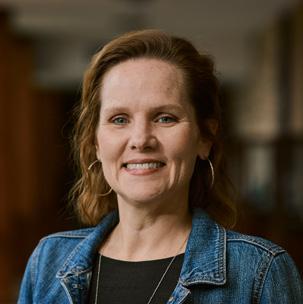
“Any church that loses its passion for the lost and unreached people of the world becomes in-grown, sick, and ultimately displeasing to the Lord. That is why the missions classes at Midwestern seek to serve the Church by equipping her to fulfill her God-given mission to disciple the nations.”
—JOE M. ALLEN III Assistant Professor of Missions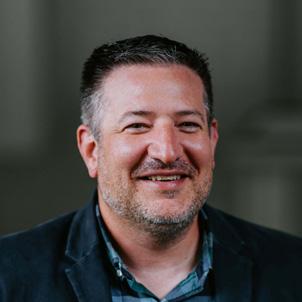


“The for the Church vision serves to remind my students that they must be in this season of training out of love for Christ’s sheep, not out of love for attention, a platform, or even success.”
“Biblical theology considers how the Christian Scriptures— both Old and New Testaments—progress, integrate, and climax in Christ. In my classrooms, I seek to train future ministers to see and savor Christ in faithful ways from God’s whole counsel.”
“For the Church gives voice to all facets of ministry and allows exploration of God’s calling for everyone. This is especially true at Midwestern where Christian educators have found a place to train for serving the Church.”
—JARED C. WILSON Assistant Professor of Pastoral Ministry
—LESLIE UMSTATTD Assistant Professor of Christian Education
—JASON DEROUCHIE Research Professor of Old Testament & Biblical Theology
“Having pastored for more than two decades, I can help students identify how the structure and con tent of Scripture should shape the structure and content of their sermons and lessons.
Every class period mat ters for every Sunday.”
—TODD R. CHIPMAN Associate Professor of Biblical Studies“Although the Church as the body of Christ began in the New Testament era, her trace can be found back in the assembly of Israelites in the Old Testament. As we study the ancient Israelites’ lives and struggles, we are learn ing about the Church.”
—SUNG JIN PARK Associate Professor of Biblical Studies“To be for the Church means to be for expos itory preaching. My desire is to train a generation of students to embrace the importance of biblical exposition and to help them develop the skills necessary to rightly interpret and proclaim God’s Word.”
Assistant Professor of Preaching & Evangelism
“Church history helps pastors and church leaders learn from those who have come before them. Teaching church history for the Church means that I want my students both to understand history accurately and apply it wisely to the challenges we face today.”
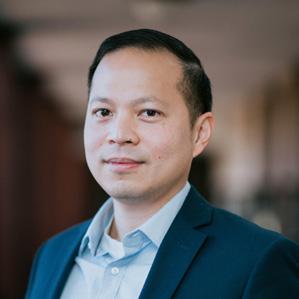
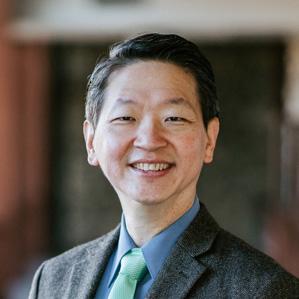
“For the Church is more than a slogan, it is a con viction that drives the way I teach the care of souls. To teach for the Church in the area of counseling is to recog nize that the Scripture frames every function of the local church as caring for souls.”
“Studying church history isn’t just an academic exercise at Midwest ern. Understanding the Great Tradition of Chris tian history can instruct, chasten, and encourage us as we serve the Lord’s Church.”
“For the Church is a natural filter for everything we do. Any Christian can train to be a musician, but our call is to prepare those who desire to serve the local church with their musi cianship, and it’s why we unapologetically train music-theologians for the Church.”
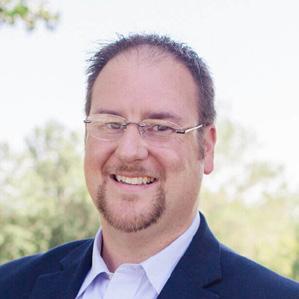
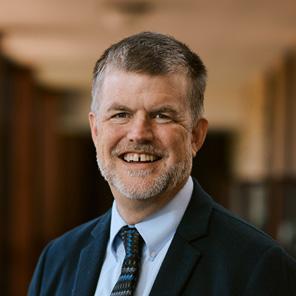
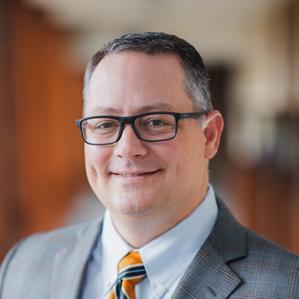
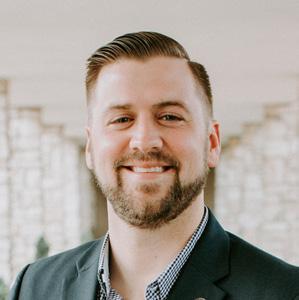
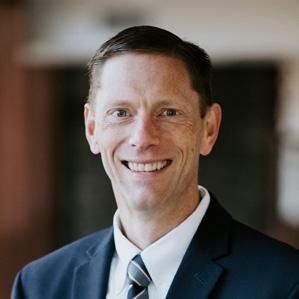 —THOMAS S. KIDD Research Professor of Church History
—MATTHEW F. SWAIN Associate Professor of Worship Ministries
—THOMAS S. KIDD Research Professor of Church History
—MATTHEW F. SWAIN Associate Professor of Worship Ministries

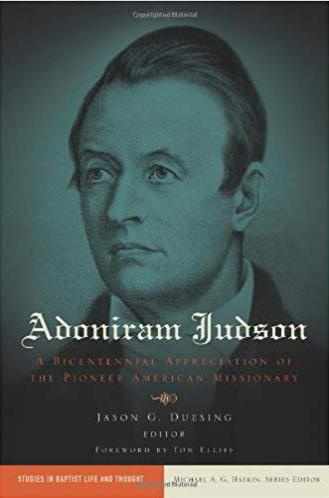

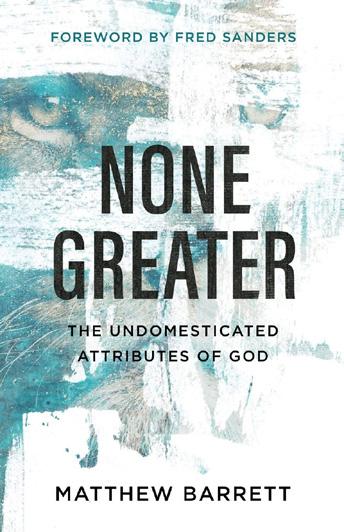

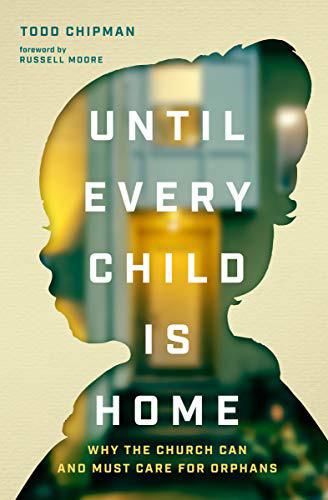

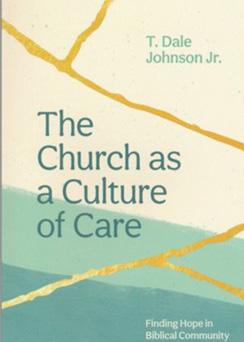


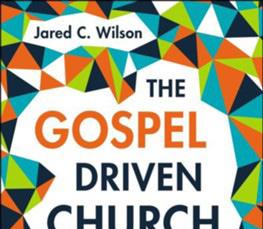

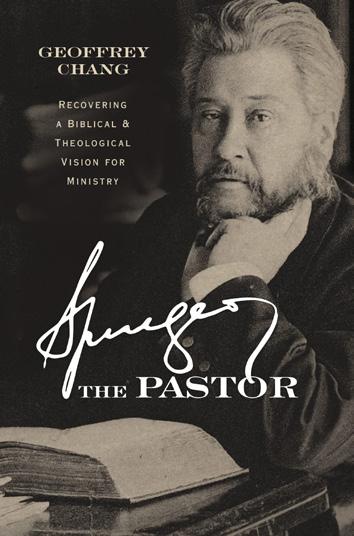
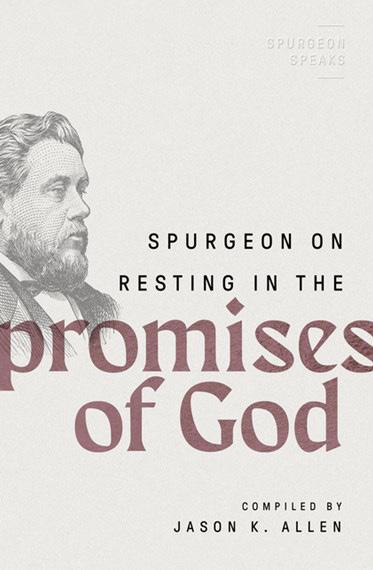




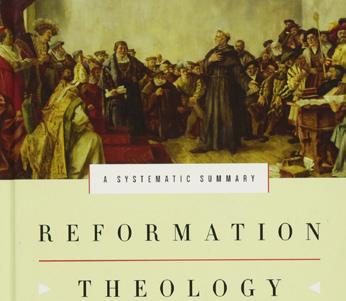

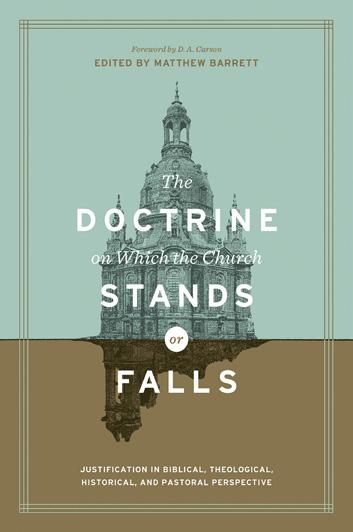


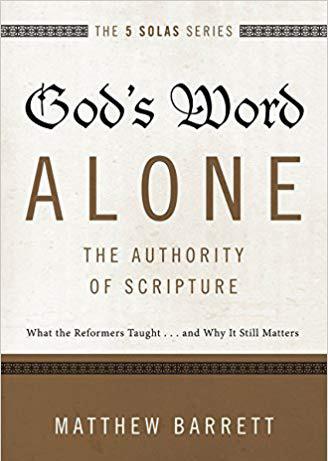

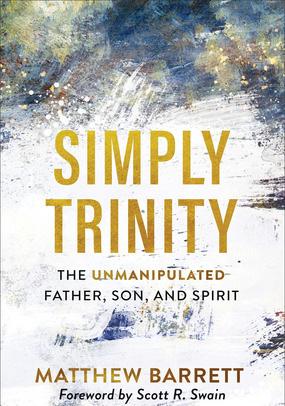

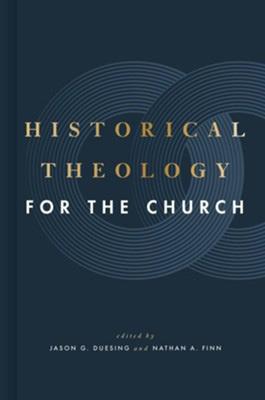
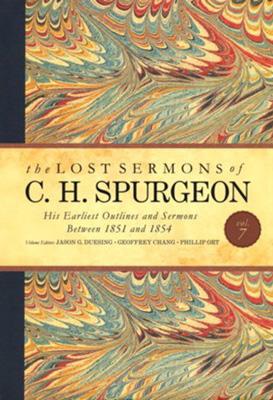
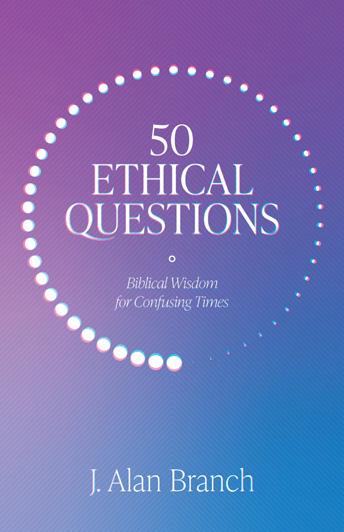
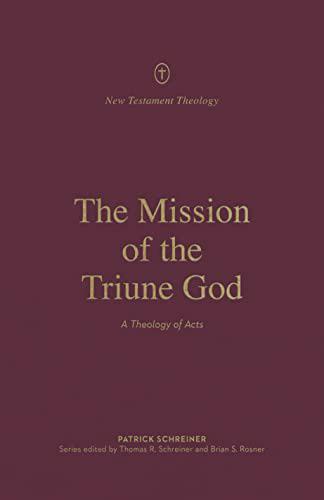
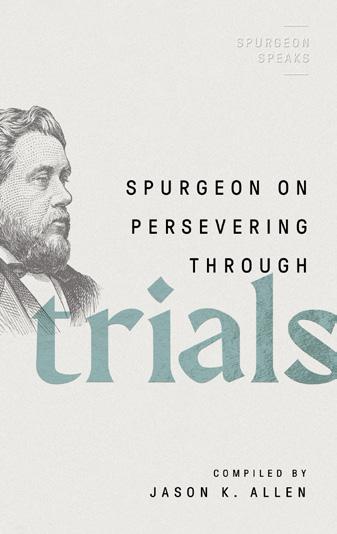
MBTS Dr. Madsen, can you tell us about the different roles you’ve served in and initiatives you’ve been a part of throughout your time at Midwestern?
THOR MADSEN I was originally hired to replace three departing professors, one in New Testament, anoth er in ethics, and a third in philosophy. I completed my Ph.D. in New Testament, but most of my formal graduate hours were in subjects like ethics and phi losophy, so I was designated as Assistant Professor of New Testament, Ethics, and Philosophy.
After four years, I served as Interim Vice President of Academic Development and Dean of the Faculty. I also served as the Chief Academic Officer for six years, the Dean of Students for three years, Dean of Graduate Studies and Director of Ph.D. Programs, and currently serve as Dean of Doctoral Studies.
During my time as the Chief Academic Officer, we started the undergraduate program, the Ph.D. pro gram, and the Fusion program. Dr. Rodney Harrison and I took the lead in restructuring our curriculum from the undergraduate to the doctoral levels as well, pur suant to Dr. Allen’s directive. Due to these changes Dr. Allen wanted to implement, Midwestern Seminary is much healthier, both educationally and financially.
MBTS This edition of the Midwestern Magazine will celebrate Dr. Allen’s 10-year anniversary at Mid western Seminary. During your time at Midwest ern, how have you seen the seminary change and what have you enjoyed most about his presidency?
TM This question is easy enough to answer, because the answer is everything. We’ve added substantially to our faculty and raised our institution’s research and writing profile. We have quadrupled in size since Dr. Allen started at Midwestern. For purposes of compar ison, when I started in 1999 we had around 300 stu dents. The current enrollment numbers at Midwestern are now much higher. I would add that Dr. Allen has connected Midwestern to some wonderful families who have been astonishingly generous toward us, and their generosity accounts for the total upgrade that ev eryone notices when coming on campus. Having been
away for even three or four years, graduates from the earlier days can hardly find their way around anymore, given the extent of the improvements.
A great deal of what accounts for these changes is down to the people that Dr. Allen has hired in areas like Institutional Relations and Executive Adminis tration. Considering who is on Dr. Allen’s cabinet right now, I really cannot see how the total makeup of his team could be any better. Nothing good can happen on my level if things don’t work on that lev el, and thankfully they do.
MBTS What have you enjoyed the most during your time at Midwestern Seminary?
TM I still tell people that doing the work of admin istration, which has to be done and done as well as possible, supports my teaching habit. Teaching is what I originally came to Midwestern to do, and I sort of backed into administration without really trying. But both tasks are essential, and I’ve enjoyed being a part of the creative process that has affected our college, graduate, and doctoral programs.
MBTS What are your hopes for students at Mid western Seminary?
TM The most demanding job in the Southern Bap tist Convention is the local church pastor. Serving as a pastor requires skill-sets and degrees of self-starting drive that hardly anyone has. A local church pastor is an SBC seminary in microcosm; he preaches, teaches, counsels, administrates, and relates to the wider pub lic on levels that no one else in the local church does. Accordingly, the purpose of Midwestern is to produce that kind of person, to the extent that our formal ed ucational assignment will allow. Midwestern also has the mission of sending out graduates who can support the work of local church ministry, as worship leaders, educational specialists, counselors, and administra tors. Everyone employed at one of our SBC seminaries belongs to this supporting cast, and we are glad to be viewed as such. If Midwestern does not serve local churches, there is no reason for it to exist at all.
After launching the for the Church vision in 2012, Midwestern Seminary saw a host of men and women from across the country joining the mission in Kansas City. Kenneth Blackwell was one of those people, being the first to move his family on campus from out of state. After receiving his Master of Divinity degree from Midwestern in 2017, Ken and his wife Amy—along with their five children—moved to Washington, MO, to serve as Associate Pastor of Discipleship at Faith Baptist Church. As a great example of graduates Midwestern hopes to produce, we’re pleased to introduce Kenneth Blackwell to you in this edition of the Midwestern Magazine.
MBTS How did your time at Midwestern Seminary help prepare you for ministry?
KEN BLACKWELL The time and work in the languages, ex egesis, background, biblical interpretation, and more, helped form a great foundation for ministry, but getting that foundation in the context of relationships and the local church was equally important. My time at Midwest ern prepared me to continue to grow as a lifelong learn er. I pray I never stop learning of God through His Word
and loving Him more in response. But it has also helped me engage the world around the church and mobilize the church to be in the world bearing the name of Christ.
Every person who can take seminary classes should. Whether you pursue a degree or not, seminary prepares you to be a better minister to your household, your church, and your community. I’m a better husband and dad because of my time at Midwestern.

MBTS Ken, you serve as Associate Pastor of Discipleship at Faith Baptist Church in Washington, MO. Tell us a little bit more about your local context and how the Lord has worked at Faith Baptist Church.
KB Part of the beauty of our context involves the story of how God worked to get us here. We weren’t looking to move. But one day, a fellow Midwestern student called and shared that he’d love to give my name to this church. Though at first we felt unprepared for a transition as a family, God quickly made it clear that this was His will, and brought all seven of us to this community. This warm and loving church received my whole family with open arms and allowed us to bring our gift ings and our baggage. They cared for us well as we began investing in them.
God has answered prayers as we continue to have new families join and see baptisms multiply. Our hope is to saturate our county with the gospel of Jesus, beginning with discipling every family God has given us stewardship over, and helping them become disciple makers. We have loved partner ing with our church and church staff to increase the fame of God’s name wherever He opens a door.
MBTS Can you tell us about your experience at Midwestern Seminary and what drew you to the seminary?
KB At the beginning of our seminary search in 2013, I would not have been able to find Mid western Seminary on a map. On the basis of a friend’s recommendation, we decided to visit Midwestern while on a winter road trip to see an other seminary. Despite the conditions, Dr. Allen, Charles Smith, and their families were very hospi table and shared passionately about the vision for the seminary. We visited the President’s home, re ceived a personal tour of the campus, and dined at a local BBQ place together.
One thing was very clear from our visit: Midwest ern existed for the Church. That meant some thing to me. I wanted to leave seminary prepared to minister the gospel in a local church context.
Our first days included more opportunities to get to know the Allen family, work and participate in campus life through Student Leadership, and build relationships with many faculty and friends that we enjoy to this day.
Though in a lot of ways we were still figuring out the combination of seminary, work, and young kids, we were grateful to be on campus. Dr. Allen and others truly cared about our growing family and invited us to be a part of what was happening at Midwestern. During my time in seminary, God taught me what it meant to study to show my self approved and how to lead as a servant while learning to lead my family.
MBTS As a graduate, what advice would you give to current students at Midwestern or those con sidering seminary education?
KB I believe seminary has benefits for everyone. If you do it right, it should make you a better dad, father, servant-leader, and minister of the gospel. I would offer three things to consider during seminary study:
1. Do not divorce your study from application of that study in the context of a local church. Be plugged in to a local body and serve meaningfully.
2. If you are married, do not let your studies become your mistress or you will likely do the same in the context of vocational ministry. You should not lead in God’s household if you don’t lead well at home. As I was told by many, “If you must choose between getting an ‘A’ at class or at home, get an ‘A’ at home.” More than that, help your family be life-long learners through your posture and inclusion of them.
3. Put to death the thought of being “ready” for ministry because of a seminary degree. It’s a lit tle like marriage. You are never ready. By God’s grace, He will call you to it, equip you for it, and see you through it as you depend on Him. But it’s better in community with other pilgrims going the same way.

Midwestern’s for the Church vision impacts the way the seminary partners with real local churches, such as Lenexa Baptist Church. With Midwestern students on the church staff and church pastors serving as seminary trustees over the years, Lenexa maintains a close relationship with the seminary. More over, President Jason Allen and his family have served the church as faithful members for many years. Lenexa Baptist Church is well-known for living out their vision to “reach, teach, and unleash,” and it was a privilege to highlight this faithful church in this edition of the Midwestern Magazine.
LENEXA BAPTIST CHURCH In January of 1988, Lenexa Baptist Church met for the first time at Christa McAu liffe Elementary School in Lenexa, Kansas, as a mission church sponsored by Emmanuel Baptist Church. In January of 1990, the church called its first pastor, Steve Dighton. After meeting in several locations throughout Lenexa, the church moved to its current site in 2001. In 2005, Lifeway named Lenexa Baptist as one of only 13 “Breakout Churches” in America. In January of 2007, LBC was also recognized by Lifeway as one of 19 “Standout Churches,” having experienced sustained growth for more than 10 years, more than 26 baptisms per year for those ten years, and a membership-to-bap tism ratio of no more than 20:1. Pastor Steve Dighton’s 25 years of leadership placed the church on a solid foundation of faithfulness to the Word of God, the mis sion of Christ, and the love of the saints. In 2015, the church called Chad McDonald to serve as Senior Pastor and he has sought to continue the tradition of biblical preaching and a passion for evangelism.
LBC The vision of Lenexa Baptist Church is to reach, teach, and unleash. We have a passion to reach the lost with the gospel so that they make a personal commitment to Jesus. Moreover, we want to teach them so that they grow in their competency to study and apply God’s Word in their daily life. Most impor tantly, though, we want to unleash them into their homes, their schools, their workplaces, and the world to make disciples for the growth of God’s kingdom and the glory of Christ. Matthew 28:18-20 and 2 Tim othy 2:2 provide the foundation for our vision and all our work and ministry at Lenexa Baptist.
MBTS Lenexa Baptist Church has been a longtime supporter of Midwestern Seminary. Can you speak to the church’s relationship to the seminary and with President Jason Allen?

LBC Since the very beginning of the church, Pastor Steve Dighton led Lenexa Baptist to be a strong sup porter of Midwestern Seminary. This relationship grew even stronger in 2012 when Pastor Steve reached out to the newly elected president of Midwestern Semi nary, Dr. Jason Allen, with a commitment to support the seminary and the leadership of Dr. Allen as he provided a vision that was for the Church.
Throughout these past 10 years, the blessing and grace of God upon Midwestern Seminary has over flowed to the Lenexa Baptist Church family. One of the initial campuses of Lenexa Baptist, now Fel lowship KC, met for a time on Midwestern’s cam pus. Midwestern has supplied LBC with numerous interns, many of whom are now full-time pastors at LBC. There is no doubt that God’s gracious success at LBC has been in no small part due to the health and growth of Midwestern. More than this, LBC has been blessed by the Allen family as they joined our church family. Dr. Allen has filled the pulpit, taught Sunday School, and served in various capacities as a lay leader within the church. We could not be more grateful for the health and growth of Midwestern and our partnership with the seminary and its leadership.
MBTS Having served in pastoral ministry for many years, what advice would you give to aspiring pa tors and ministry leaders at Midwestern Seminary?
LBC If I have known any measure of success in min istry, it has been founded upon a daily private time alone with God in prayer and the study of His Word. To anyone aspiring to pastoral or ministry leader ship, commit yourself to becoming a Psalm 1 man or woman. In your ministry, you will either operate out of a stagnant pond or a flowing stream of God’s presence. I have found that when I abide in His pres ence I not only find the supply I need to complete His work, but He is able to do abundantly beyond what I could think or ask for His glory.
Midwestern Seminary is proud to welcome a new class of presidential interns to campus each year. Each intern has the opportunity to experience the behind-the-scenes of seminary life, study in close proximity with one another and seminary leadership, and grow in their ministry callings. Presidential interns represent the heart of Midwestern Seminary—ministry leaders who exist for the Church. Noah Graves is one such presidential intern who embodies this vision. Noah, who served as a presidential intern during his first year in Kansas City, was recently sent to serve the local church in Fayetteville, AR. We’re excited to introduce him to you in this edition of the Midwestern Magazine.
MBTS Noah, why did you decide to study at Midwestern Seminary?
NOAH GRAVES Although I had just graduated from Oklahoma Baptist University with a degree in Bib lical Studies, I still carried an ongoing desire to continue my theological education for the sake of ministry preparation. I found it incredibly important not to neglect this season of growth and prepara
tion; therefore, my wife, Taylor, and I began pray ing about spending our next season at seminary. We didn’t know much about where the Lord was leading us in the various ministry opportunities; we just both knew that God was calling us to love and lead in His Church. Hence, when we saw the vision and heard the ways Midwestern was equip ping students to be used for the Church , we be gan feeling led to seek more.

So, we took a trip! We got some close friends and spent a fall break during college visiting Midwest ern’s campus and spending some time in Kansas City. It did not take long for us to fall in love with both the campus life of Midwestern and the city life of Kansas City. There was an obvious and mu tual feeling that God was leading us to uproot our lives and spend a season at Midwestern.
MBTS What was it like to be a presidential intern at Midwestern Seminary?
NG Serving under Dr. Allen was one of the greatest honors of my life. To see the vision of Midwest ern displayed through the teaching, preaching, and leading of this specific individual affirmed that Midwestern Seminary was where I was supposed to be. This internship allowed me to gain a grand er glimpse into the logistics that occur not just in our SBC seminaries, but also into the pastorate. Dr. Allen engages with a variety of students, pas tors, and community leaders constantly, of which we got a front row seat and were honored to serve in several capacities as well. The internship even allowed us to obtain a private Pastoral Ministry class taught by Dr. Allen, which served as one of the most formative courses I have taken. He is well-fit to serve our convention through this role, and I cannot think of a greater man to sit under during my seminary preparation.
MBTS While you were a residential student this past year, you’re planning on moving to Arkan sas and continuing as an online student at Mid western. Tell us about your transition and the ministry you’ll be involved with.
NG We did not expect to move this soon from Kansas City, but this past summer a church in Fayetteville, AR reached out to us concerning a college ministry position. After months of prayer and counsel, my wife and I felt led to accept it and make the transition. Since I’m committed to ob taining my Master of Divinity from Midwestern, I was blessed to see I was able to continue my de gree online. Midwestern offers a Global Campus that allows students to engage in live lectures from
anywhere in the world without forfeiting their current ministry assignment. This was both a relief and a gift to me. Although I am disappointed to bid farewell to the seminary relationships I have made, I am confi dent we are following direction from the Lord while continuing to value my theological education.
MBTS What are the benefits of being a residential student at Midwestern?
NG The professors Midwestern has are not only worldclass scholars, but they are intentional individuals who desire to pour in to you and your family. The relation ships I made with Midwestern faculty and staff were certainly the greatest benefit that I could have re ceived. Whether we were getting coffee before chap el, lunch after class, or discussing questions before our test, I felt valued and loved by those at the seminary.
Alongside that same thought, the residential life is so grand because of the immense amount of stu dents doing life with you! There are a variety of stu dents from a variety of backgrounds in all seasons of life at Midwestern, which makes this campus so special. I truly believe that we made some lifelong friends from spending time on this seminary campus.
MBTS How has your time at Midwestern deepened your love for the Lord and His Church?
NG There is a posture of worship that comes from following God through theological education. Whether I am learning the biblical languages, study ing for Church History, or writing a sermon for my preaching lab, I am able to rest assured knowing it is all for the glory of the Lord. My reading assign ments, research papers, and theological reflections have deepened my love for the Lord, and have also excited me to serve His Church. Every aspect of my interaction with Midwestern has resulted in doxolo gy, for which I am immensely grateful. I would not be able to serve Christ and His Church in such a high ca pacity if it weren’t for the investment I am making at Midwestern Seminary, and also the investment that Midwestern Seminary is making in me.
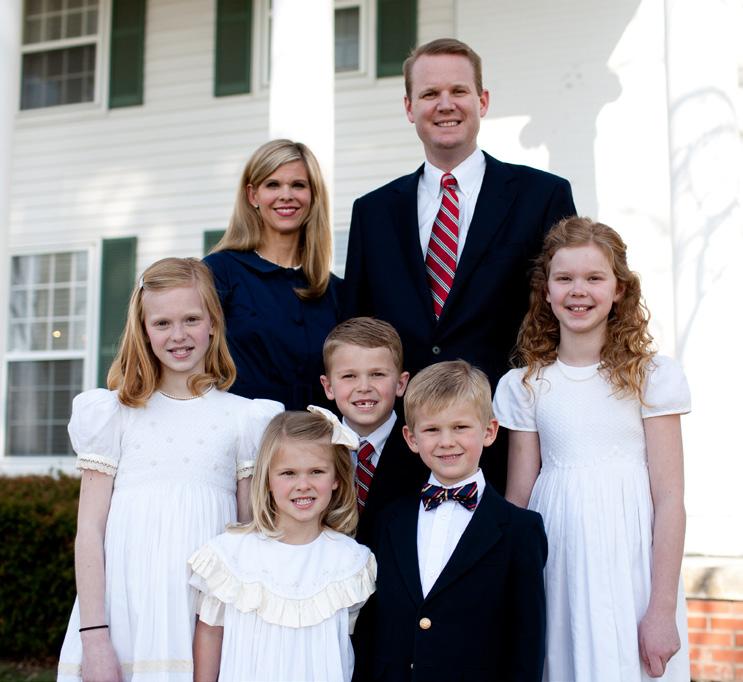
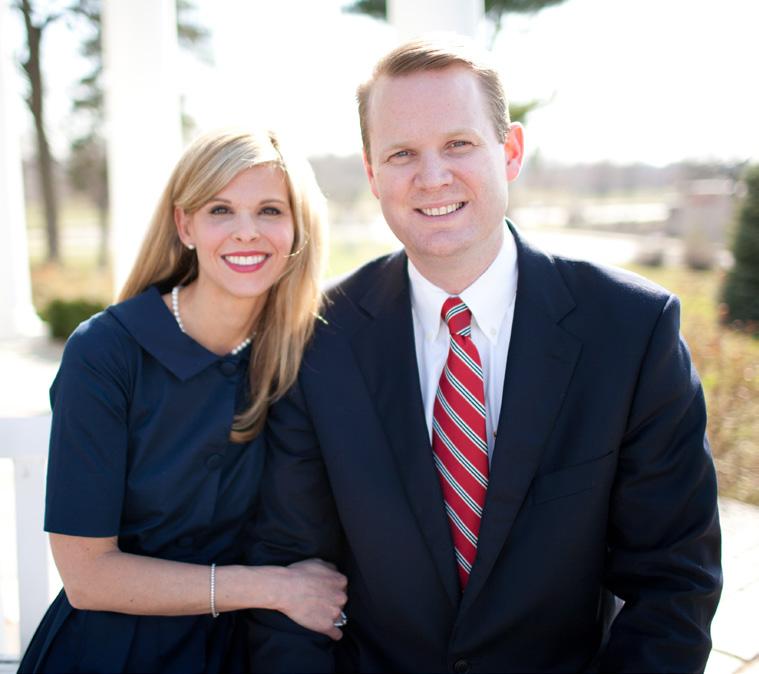
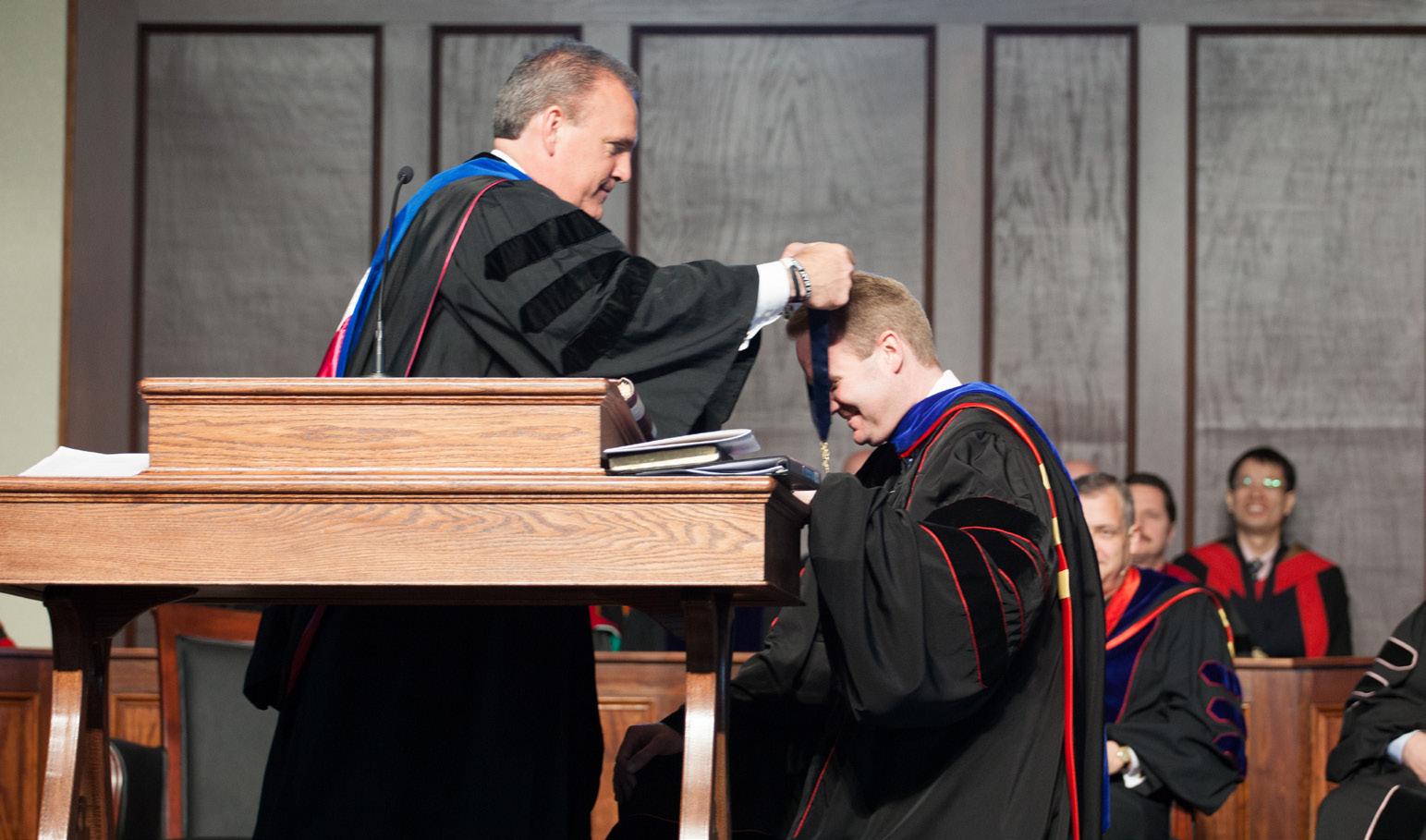
JASON ALLEN ELECTED AS THE SEMINARY’S FIFTH PRESIDENT

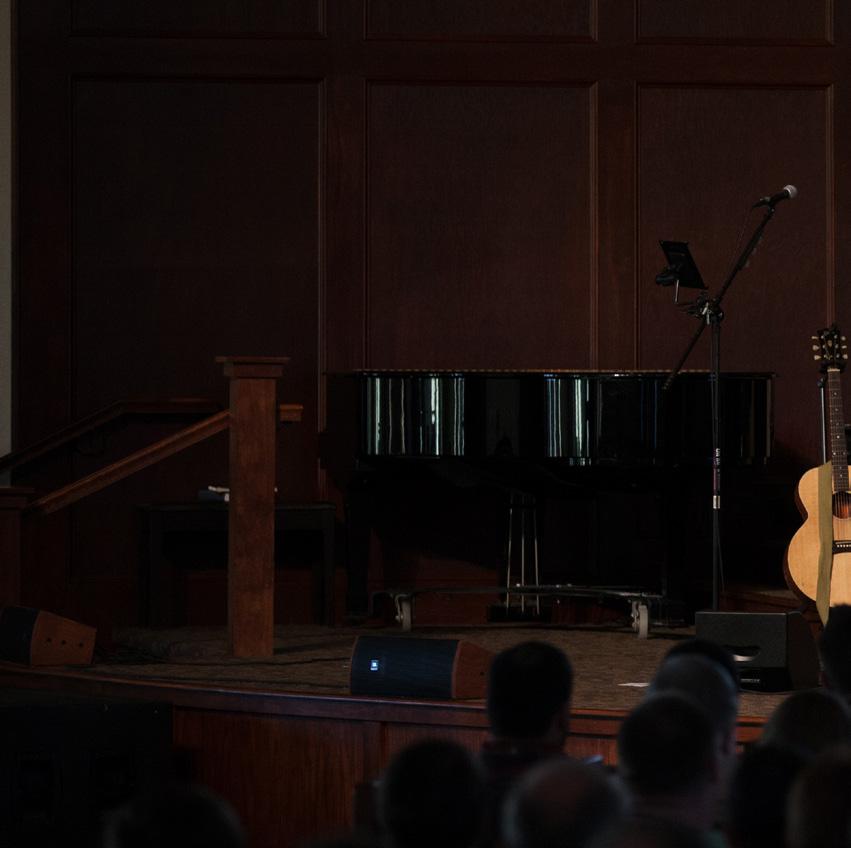
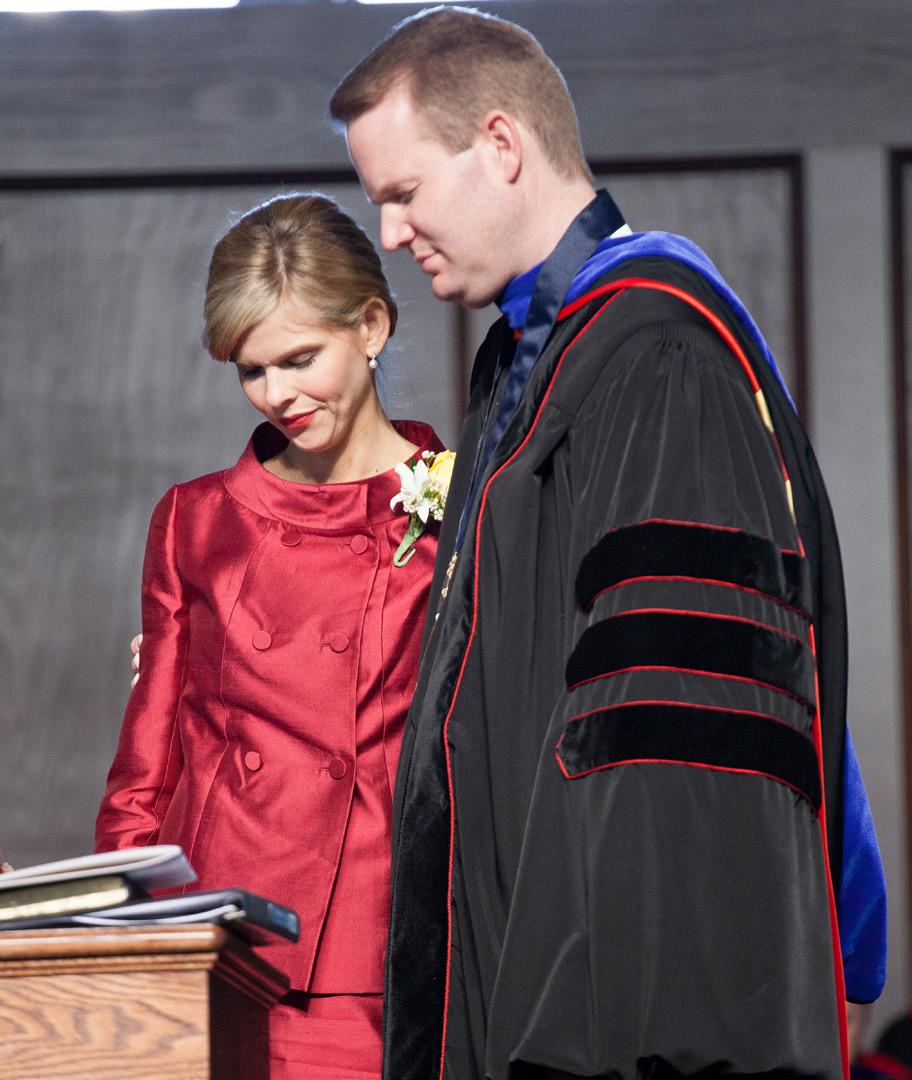
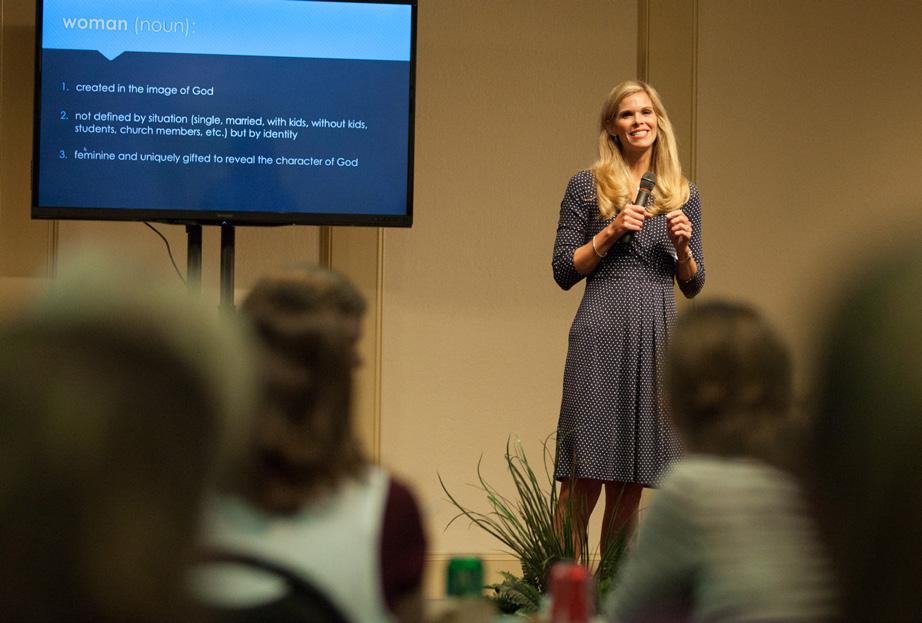
JASON ALLEN INAUGURATED
FOR THE CHURCH VISION ANNOUNCEDFIRST SPRING PICNICKAREN ALLEN RELAUNCHES MWI RELAUNCH OF MWI INAUGURAL FTC NATIONAL CONFERENCE
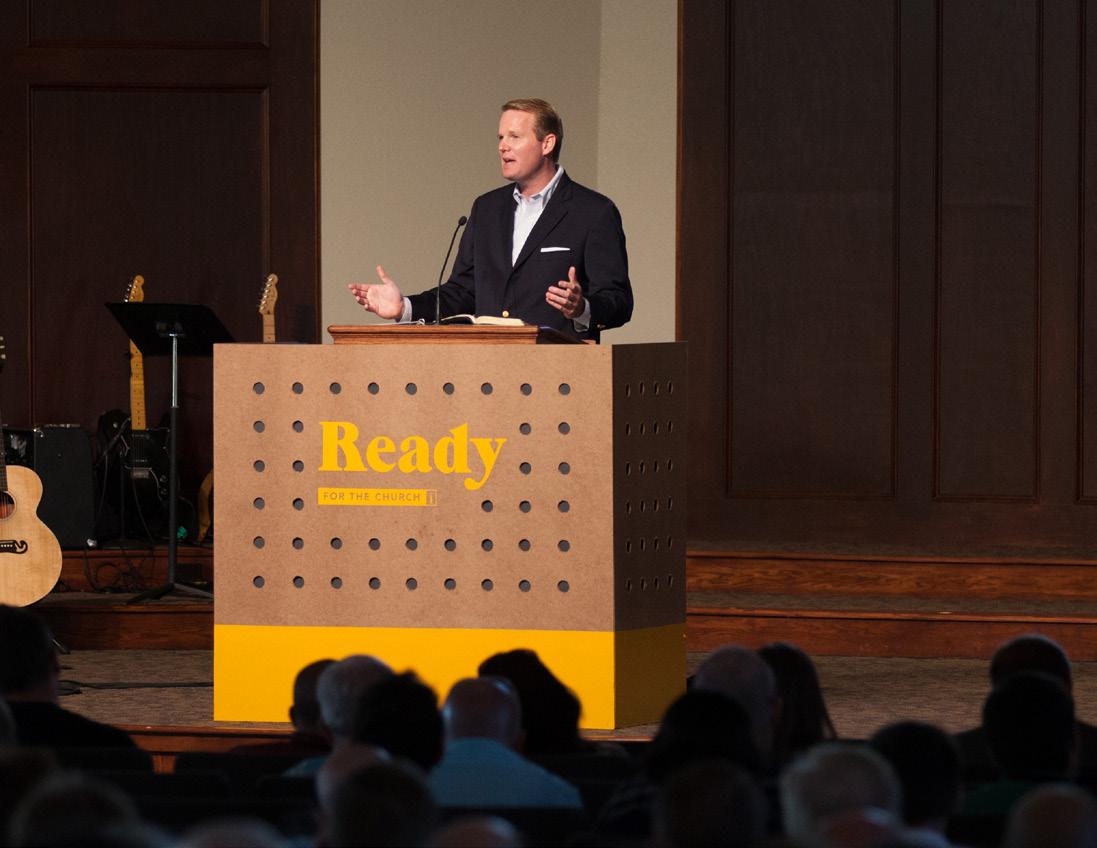
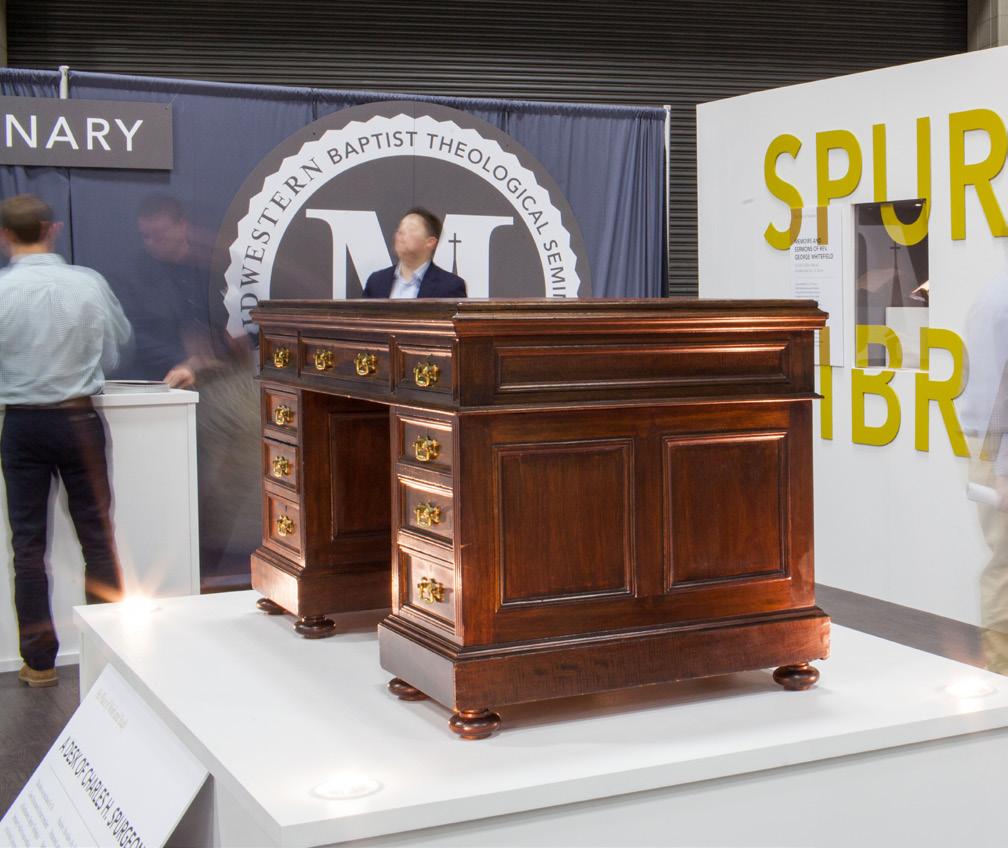
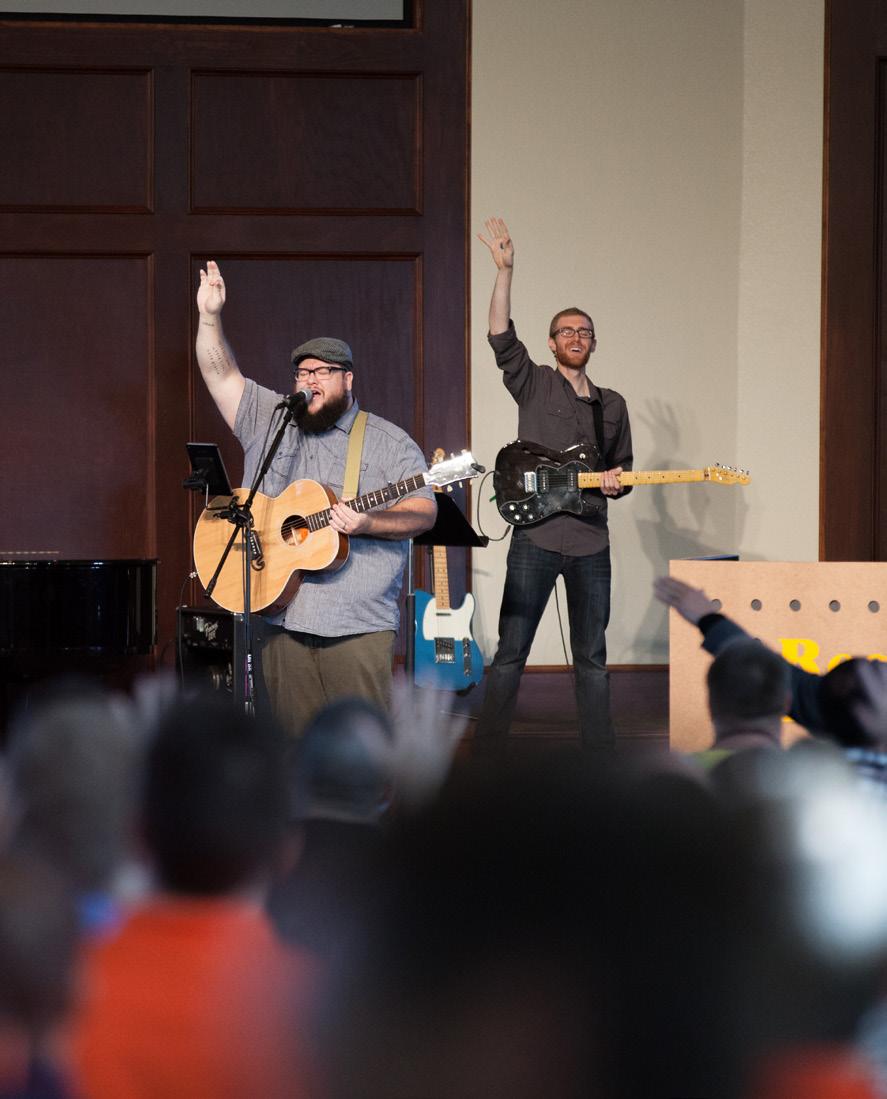
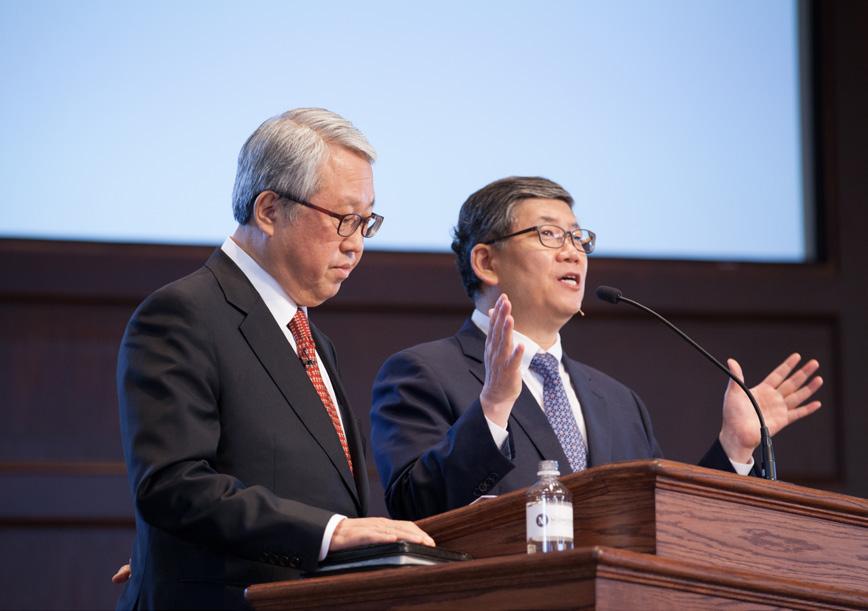
MBTS HOSTS INAUGURAL FOR THE CHURCH NATIONAL CONFERENCE
COLLEGE EXPANSION
SPURGEON CENTER FOR BIBLICAL PREACHING ESTABLISHED
DANIEL LEE CHAPEL DEDICATEDDANIEL LEE CHAPEL DEDICATON INAUGURAL FTC NATIONAL CONFERENCE SPURGEON BOOTH AT T4G
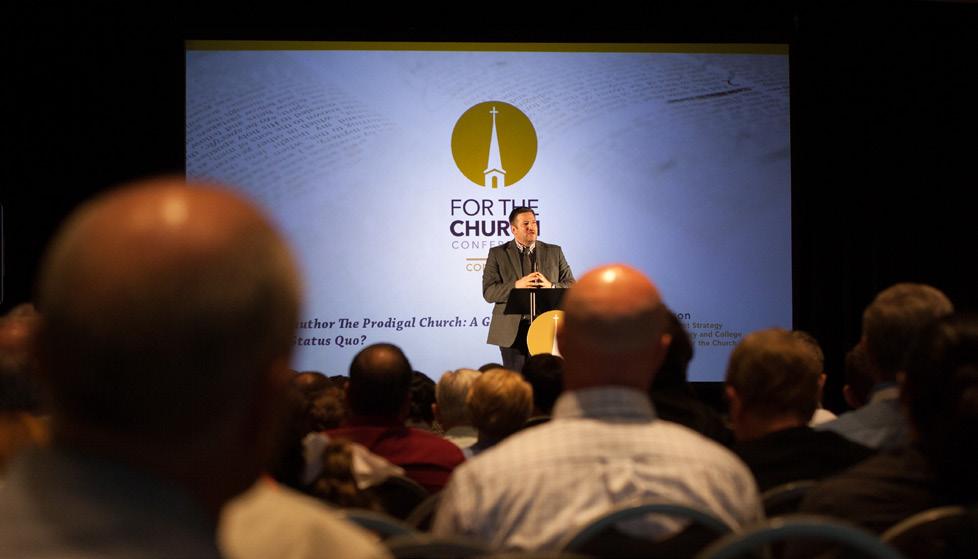


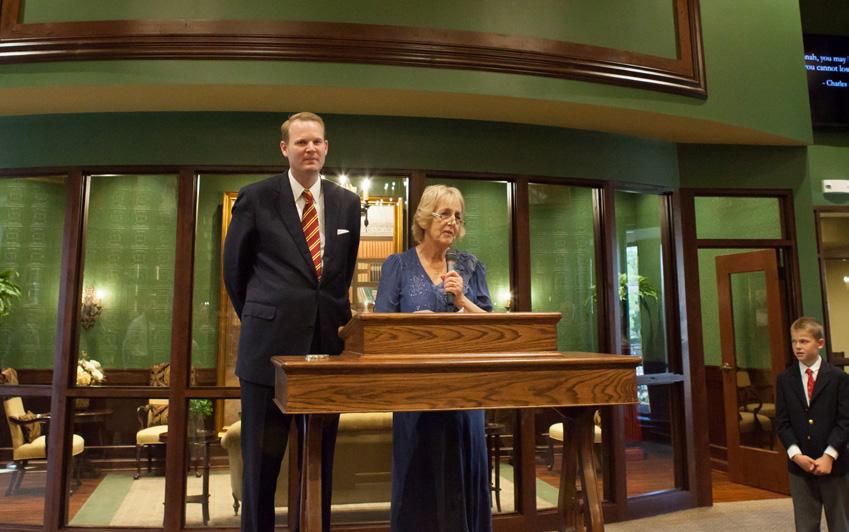


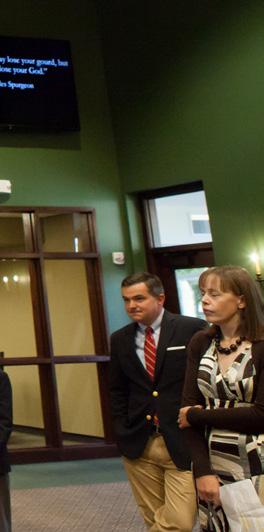


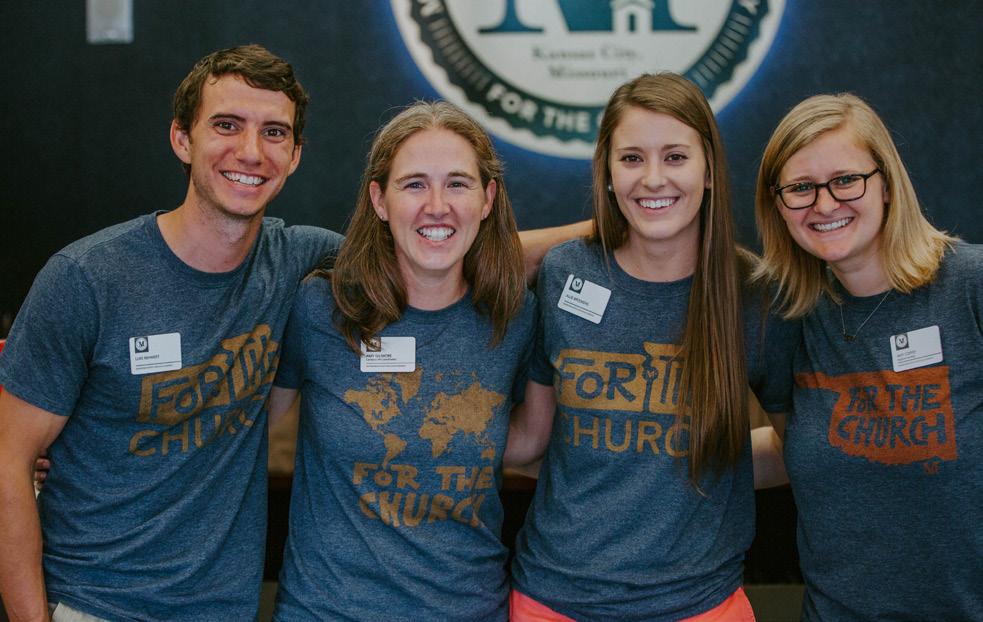
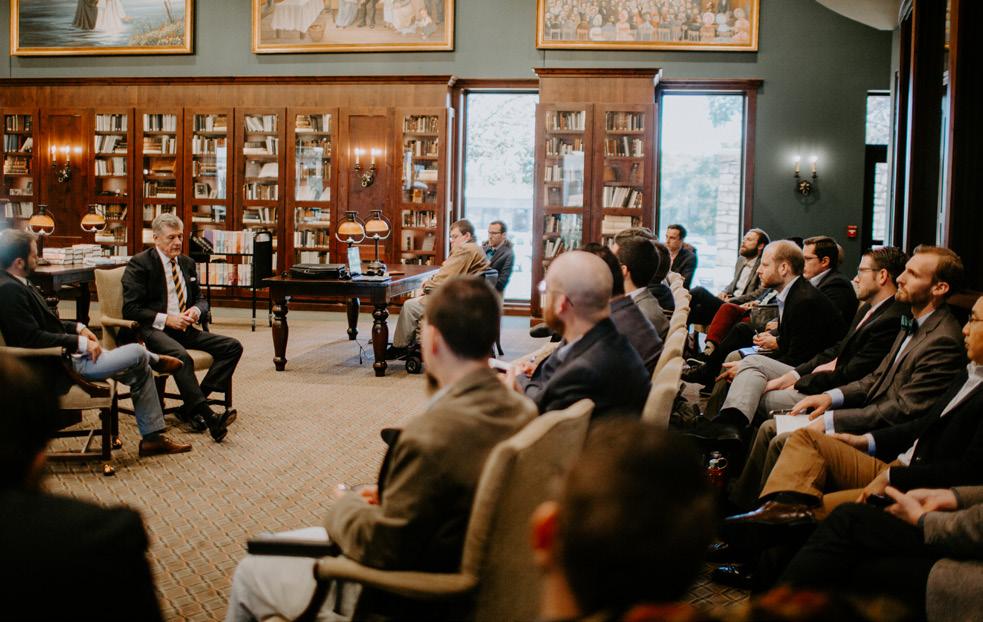

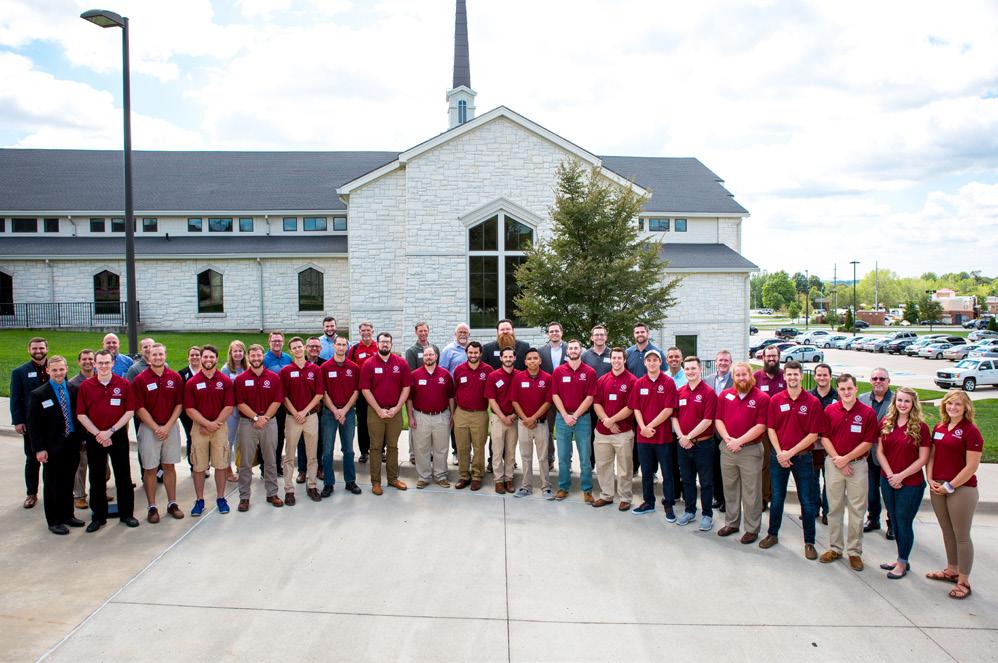
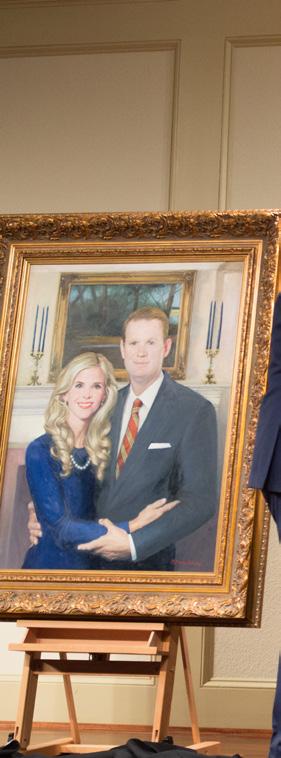
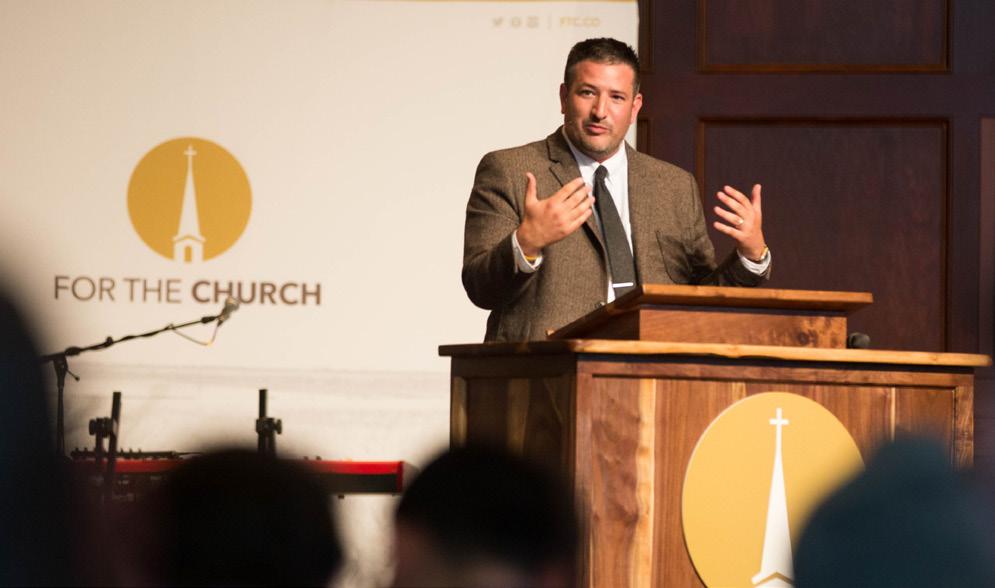

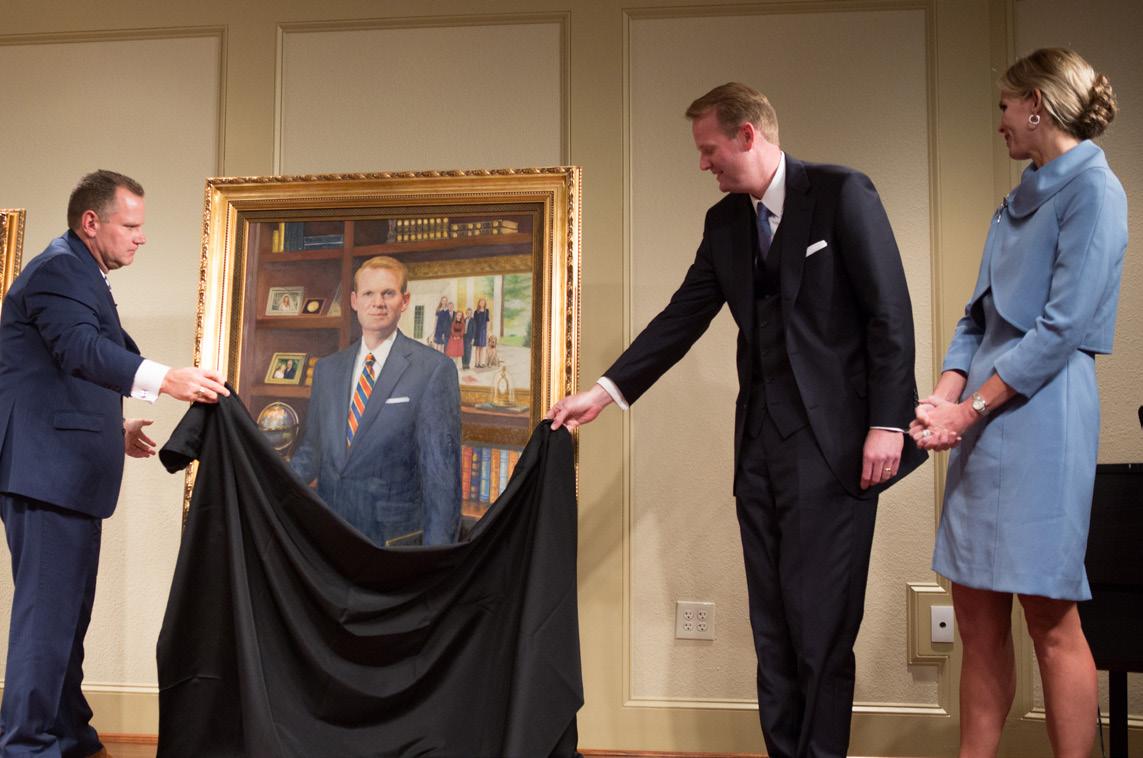
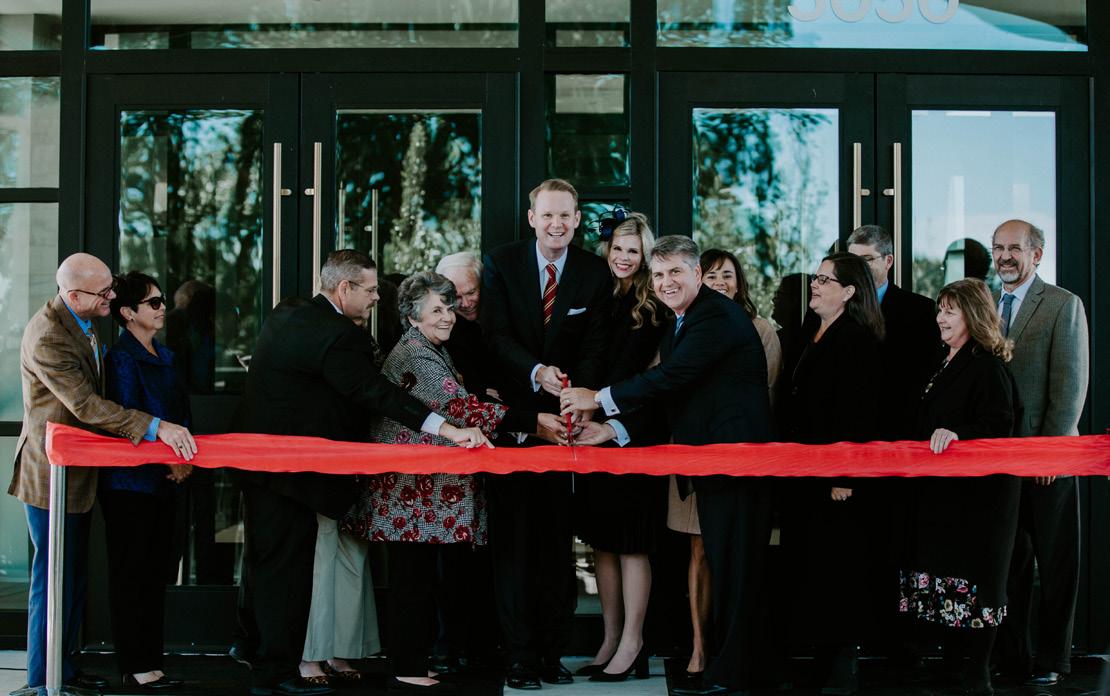

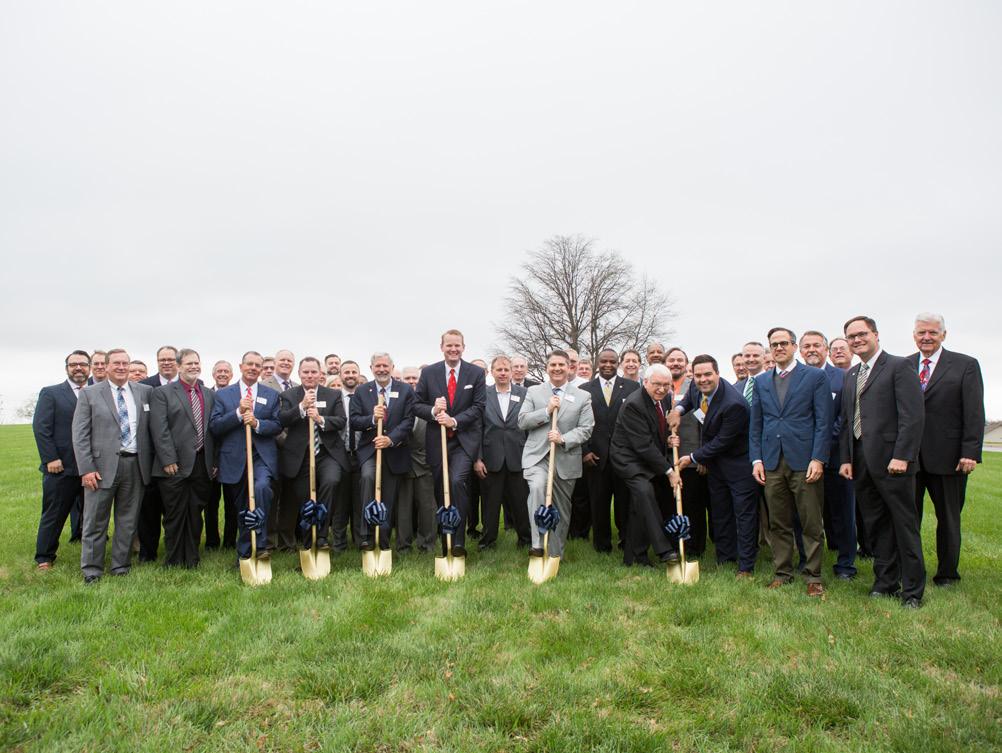
STUDENT CENTER DEDICATIONGROUNDBREAKING FOR THE MATHENA STUDENT CENTER DR. ALLEN’S 5 YEAR ANNIVERSARY
MATHENA STUDENT CENTER DEDICATION
STUDENT
COLLEGE RENAMED “SPURGEON COLLEGE” ANNOUNCES FOR THE KINGDOM VISION
MATHENA STUDENT CENTER OPENS
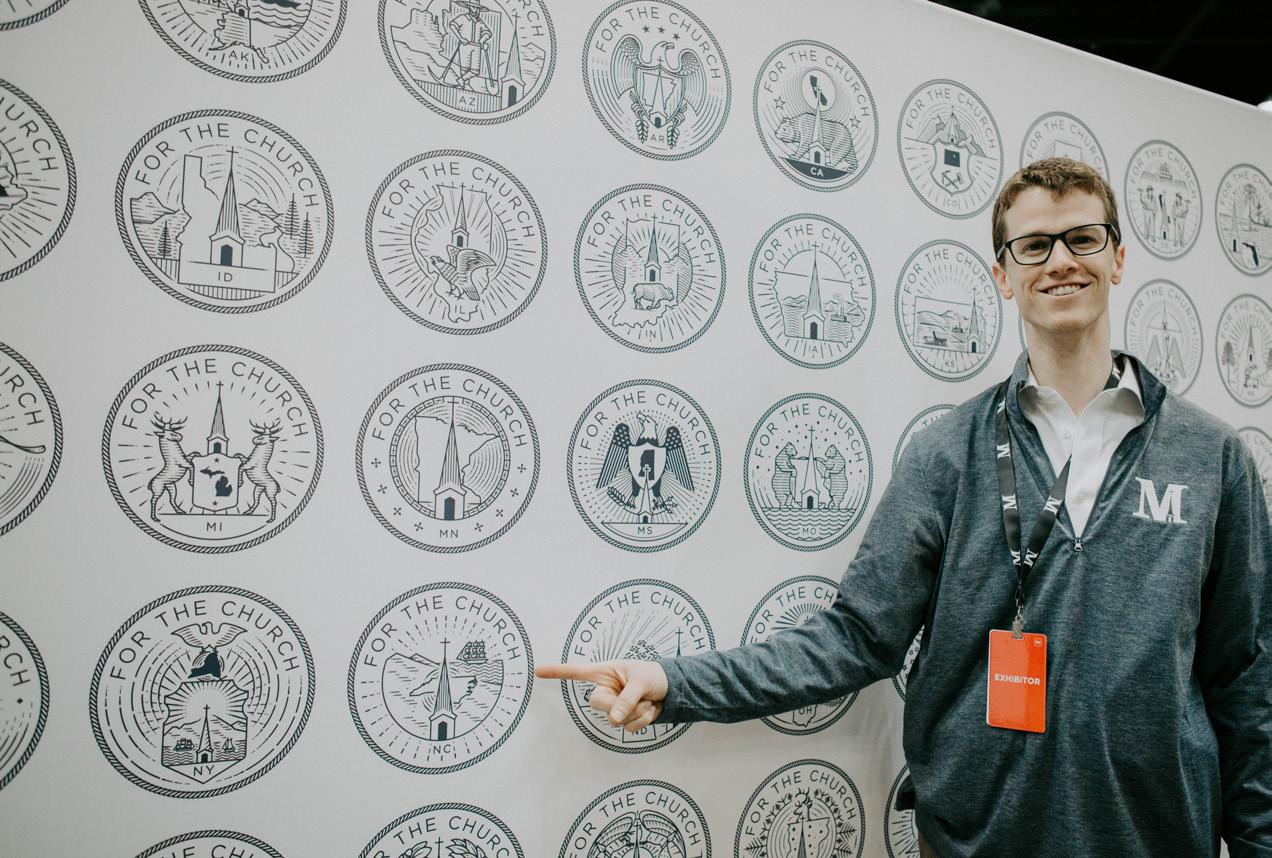



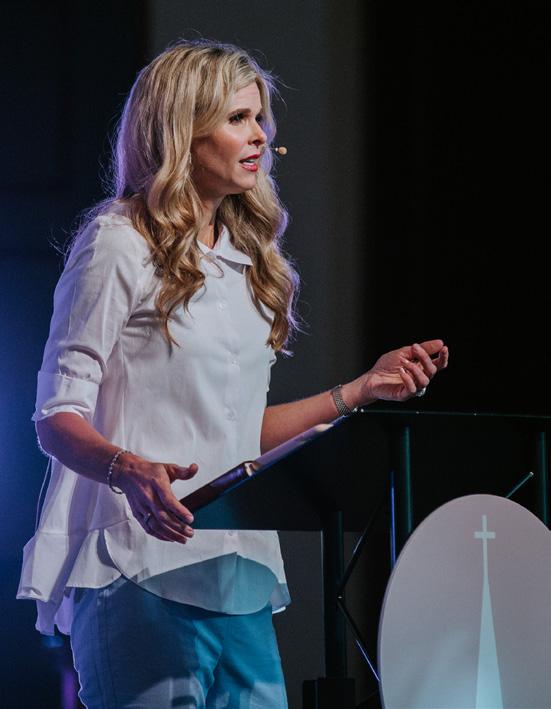
ROUND OF FTC STATE SHIRTS GIVEAWAYMBTS BOOTH AT TGC
SPURGEON COLLEGE LAUNCHES FIRST SPORTS TEAM, MEN’S BASKETBALL
SPURGEON COLLEGE PARTNERS WITH NAMB FOR FUSION NORTH AMERICA
CAMPUS HOSTS FIRST “MEET ON THE LAWN” GATHERING
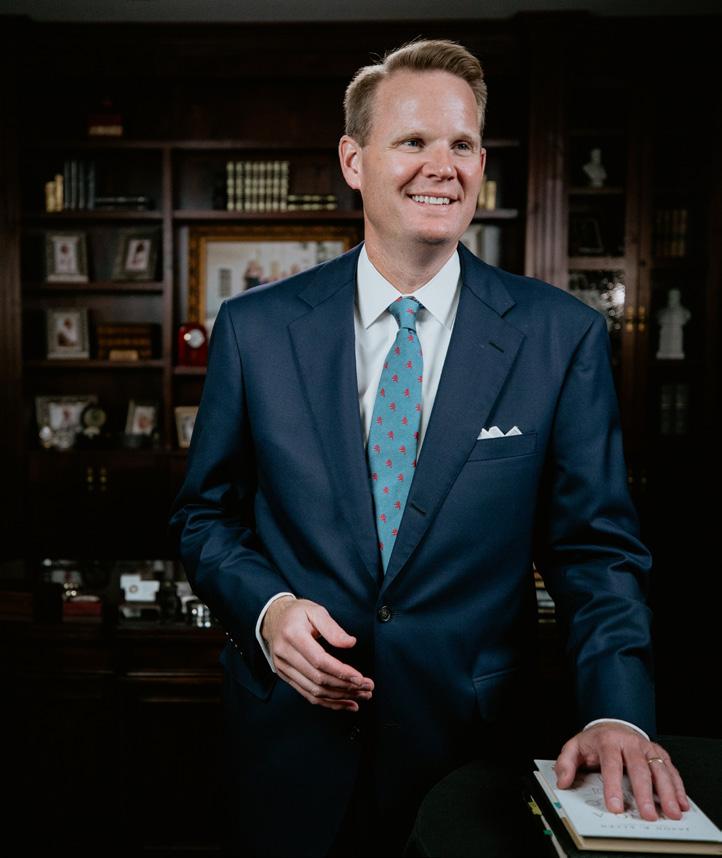
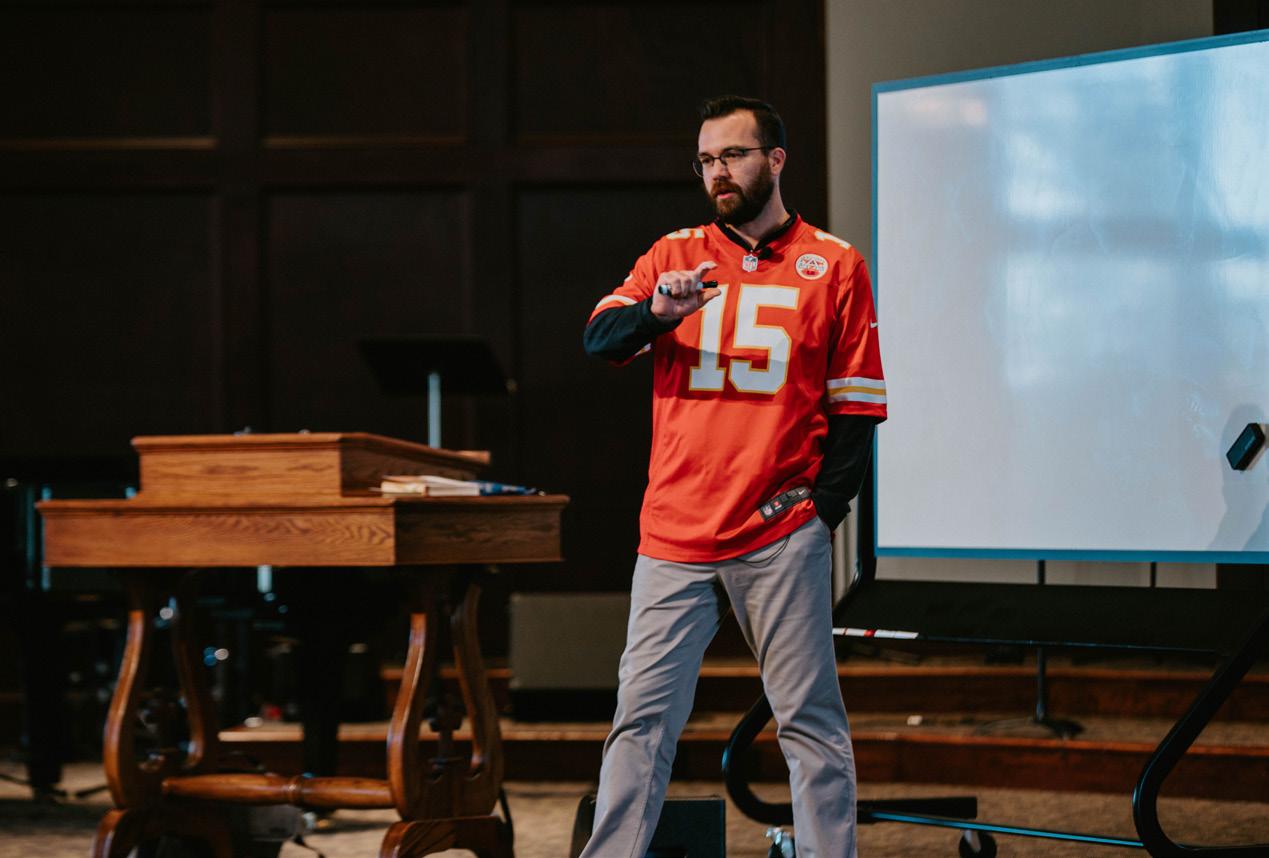


COURSE WITH DR. ALLEN
OF

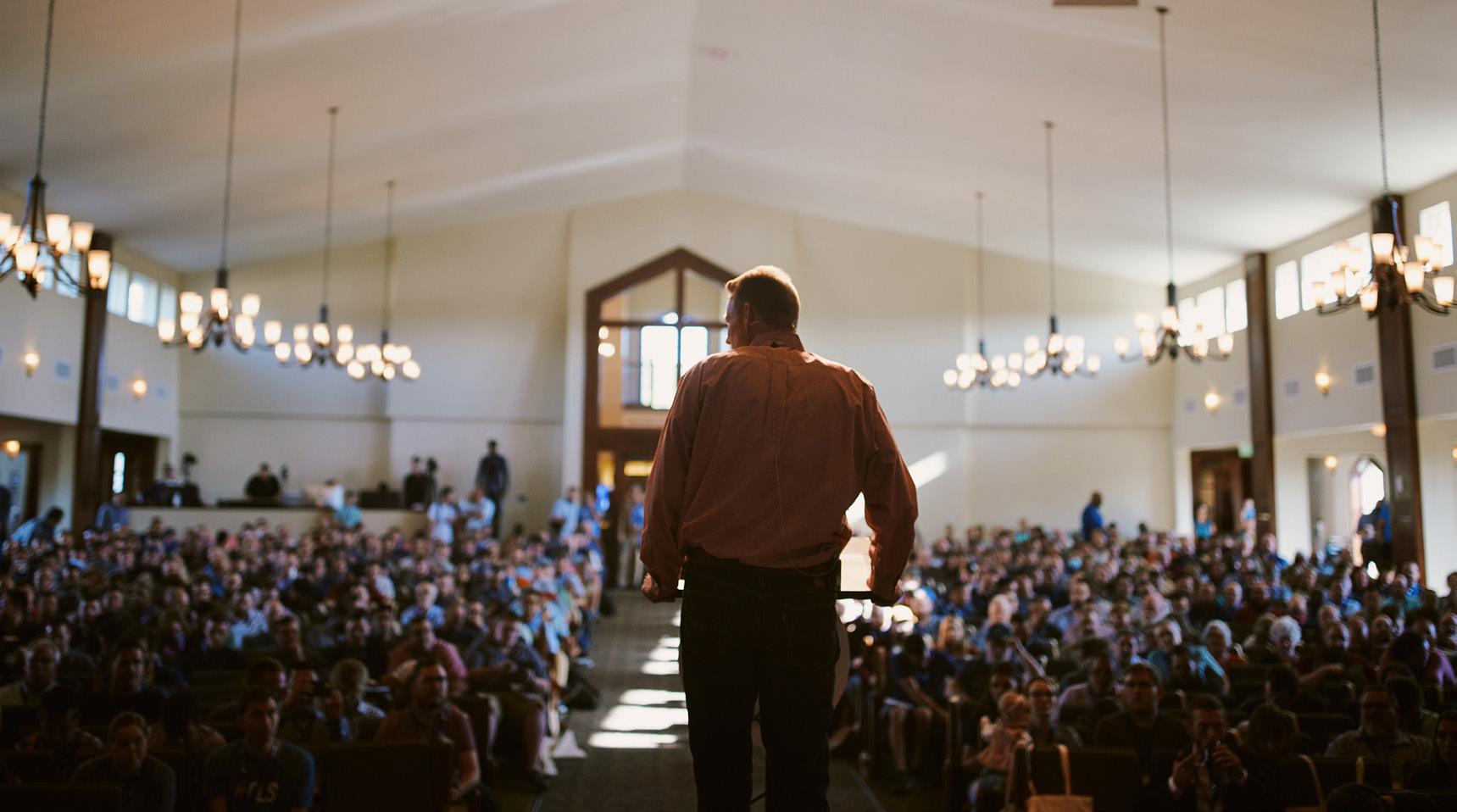

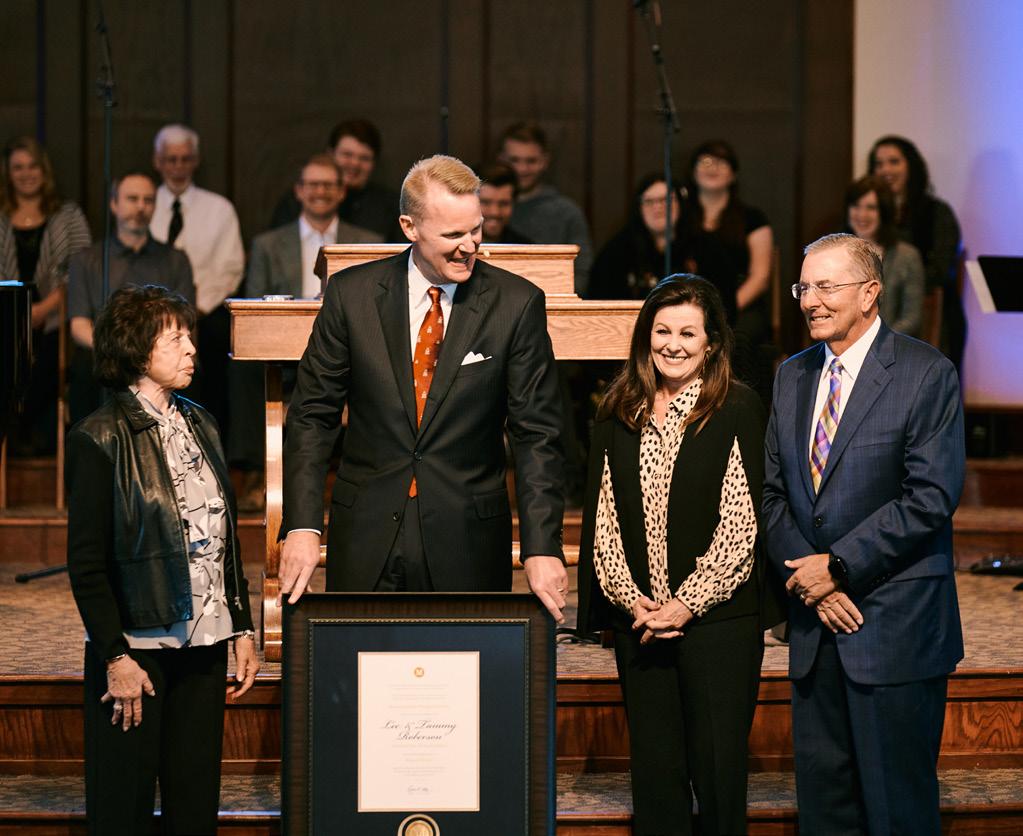
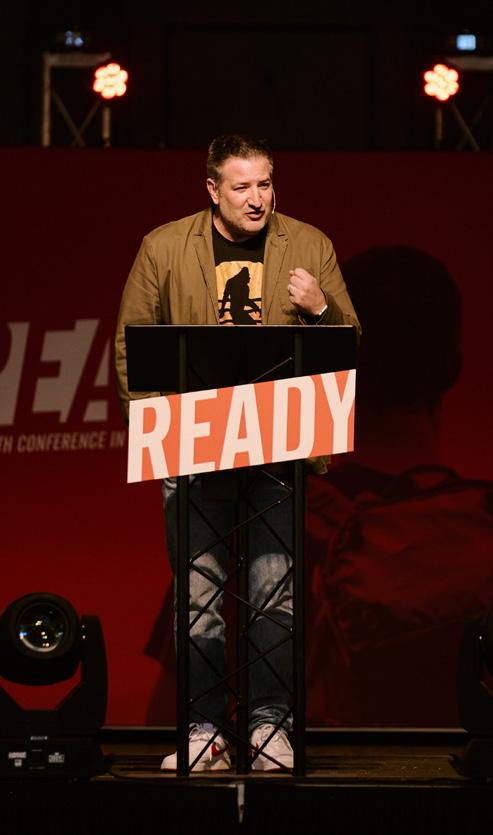
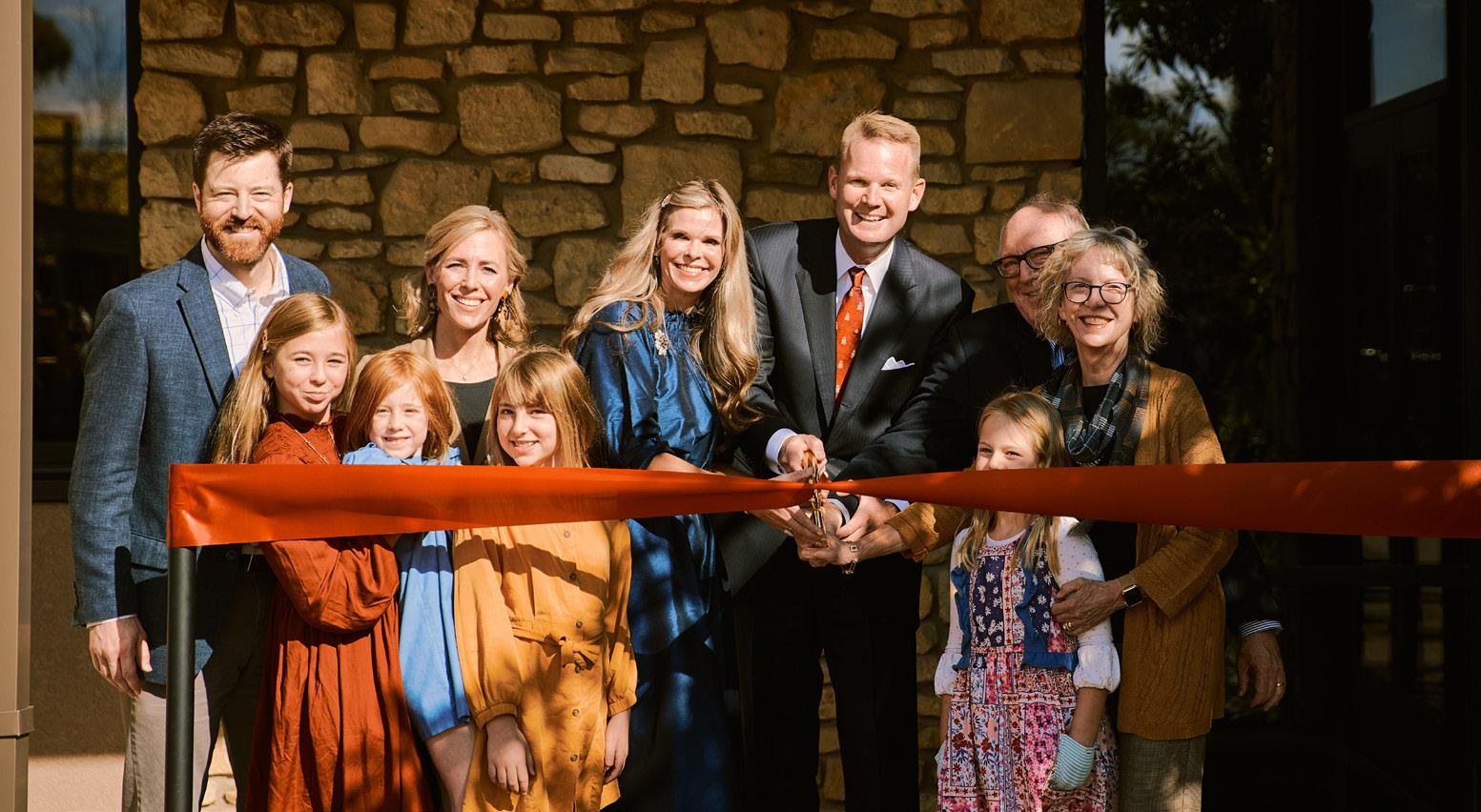

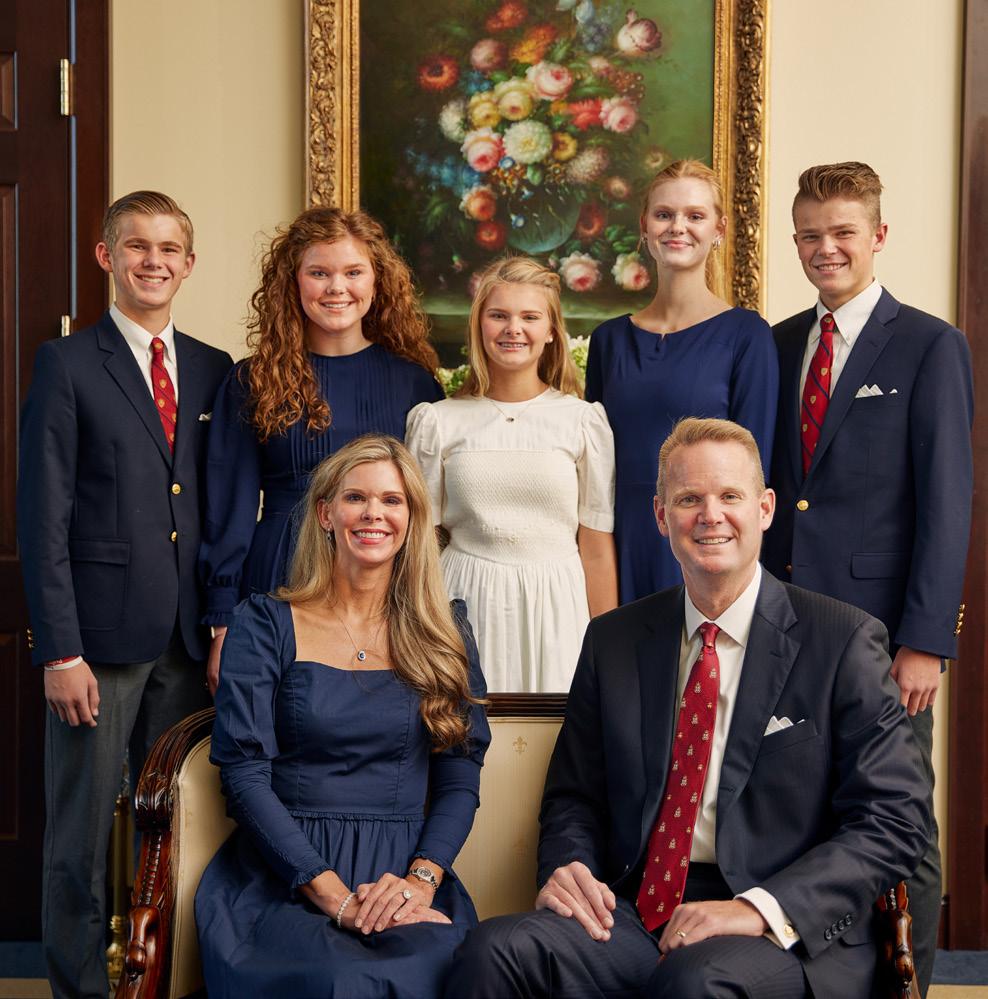
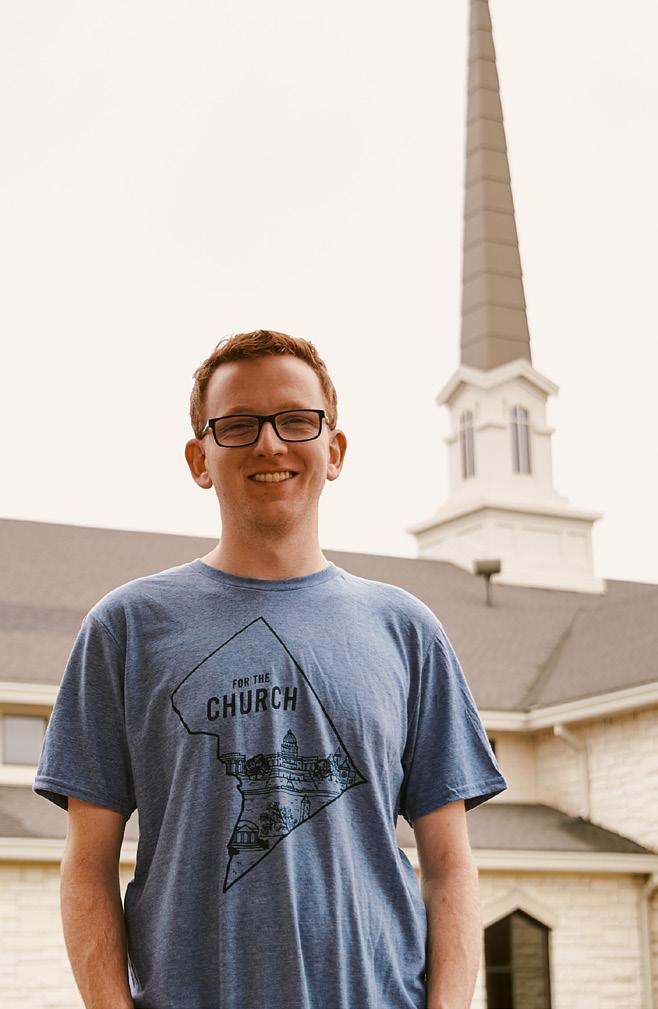

THIRD ROUND OF FTC STATE SHIRT GIVEAWAYSTHE ALLEN FAMILY THIRD ROUND OF FTC STATE SHIRTS SPURGEON COLLEGE DORM RENOVATED DR. ALLEN’S 10 YEAR ANNIVERSARY DORM RENOVATIONS SPRING PICNIC
